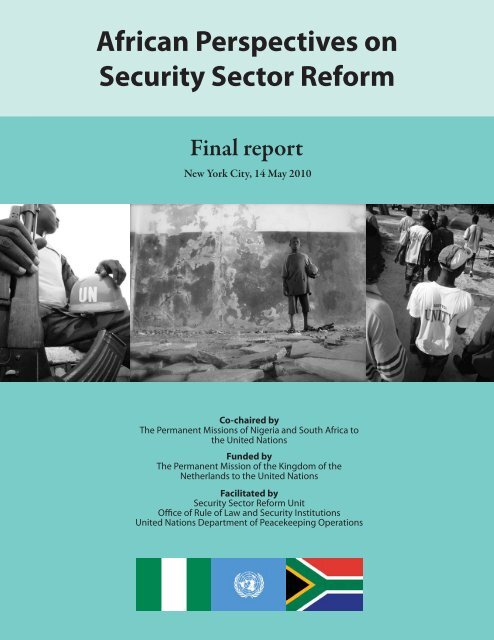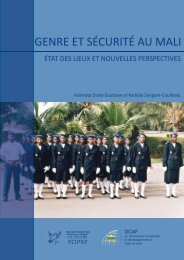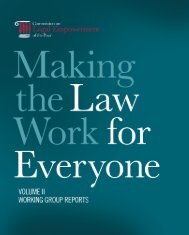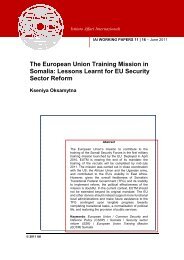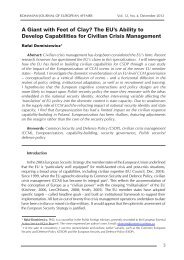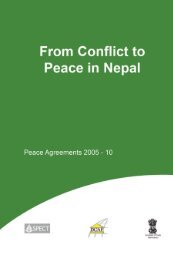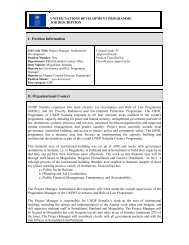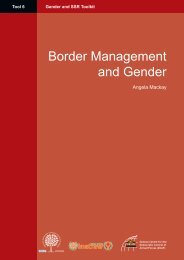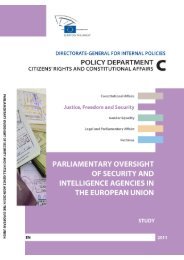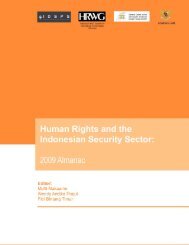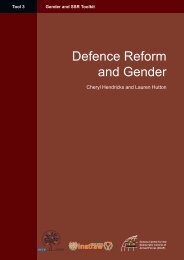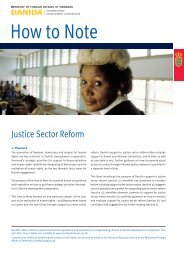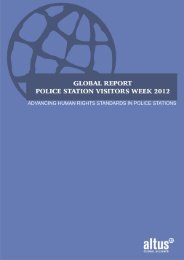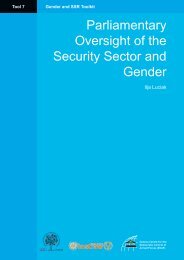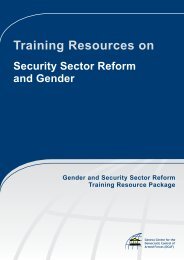African Perspectives on SSR.pdf - UN Peacemaker
African Perspectives on SSR.pdf - UN Peacemaker
African Perspectives on SSR.pdf - UN Peacemaker
Create successful ePaper yourself
Turn your PDF publications into a flip-book with our unique Google optimized e-Paper software.
<str<strong>on</strong>g>African</str<strong>on</strong>g> <str<strong>on</strong>g>Perspectives</str<strong>on</strong>g> <strong>on</strong><br />
Security Sector Reform<br />
Final report<br />
New York City, 14 May 2010<br />
Co-chaired by<br />
The Permanent Missi<strong>on</strong>s of Nigeria and South Africa to<br />
the United Nati<strong>on</strong>s<br />
Funded by<br />
The Permanent Missi<strong>on</strong> of the Kingdom of the<br />
Netherlands to the United Nati<strong>on</strong>s<br />
Facilitated by<br />
Security Sector Reform Unit<br />
Office of Rule of Law and Security Instituti<strong>on</strong>s<br />
United Nati<strong>on</strong>s Department of Peacekeeping Operati<strong>on</strong>s
High-level Forum <strong>on</strong> <str<strong>on</strong>g>African</str<strong>on</strong>g> <str<strong>on</strong>g>Perspectives</str<strong>on</strong>g> <strong>on</strong> <strong>SSR</strong>, 14 May 2010<br />
Experts-level Seminar <strong>on</strong> <str<strong>on</strong>g>African</str<strong>on</strong>g> <str<strong>on</strong>g>Perspectives</str<strong>on</strong>g> <strong>on</strong> <strong>SSR</strong>, 13 May 2010<br />
The report was produced in June 2011 by the Security Sector Reform Unit,<br />
Office of Rule of Law and Security Instituti<strong>on</strong>s, Department of Peacekeeping Operati<strong>on</strong>s<br />
Cover photos/Thorodd Ommundsen
een adequately explored and brought<br />
into <strong>SSR</strong> practice. We also know that<br />
while each c<strong>on</strong>text has its own specific<br />
history, priorities and dynamics, there<br />
are general less<strong>on</strong>s that can be learned<br />
about <strong>SSR</strong> policy and practice in Africa<br />
and elsewhere that we have not adequately<br />
explored.<br />
“The new opportunities inherent to intra-<str<strong>on</strong>g>African</str<strong>on</strong>g> <strong>SSR</strong> partnerships have not yet been adequately explored”, says<br />
Mr. Dmitry Titov, Assistant Secretary-General for Rule of Law and Security Instituti<strong>on</strong>s, <strong>UN</strong> Photo/Martine Perret.<br />
A word from:<br />
Mr. Dmitry Titov, Assistant Secretary-General for Rule<br />
of Law and Security Instituti<strong>on</strong>s<br />
Learning From <str<strong>on</strong>g>African</str<strong>on</strong>g><br />
Experiences in <strong>SSR</strong><br />
The internati<strong>on</strong>al debate around security<br />
sector reform (<strong>SSR</strong>) has become more<br />
vibrant in recent years, particularly in<br />
Africa, where States and societies have<br />
been engaged in <strong>SSR</strong> for decades. Many<br />
<str<strong>on</strong>g>African</str<strong>on</strong>g> Member States have recognized<br />
that <strong>SSR</strong> is necessary for early recovery<br />
from c<strong>on</strong>flict, ec<strong>on</strong>omic development<br />
and sustainable peacebuilding, as well<br />
as regi<strong>on</strong>al stability and internati<strong>on</strong>al<br />
peacekeeping. This is why the United<br />
Nati<strong>on</strong>s Department of Peacekeeping<br />
Operati<strong>on</strong>s (DPKO) is supporting approximately<br />
ten <str<strong>on</strong>g>African</str<strong>on</strong>g> Member States<br />
to undertake <strong>SSR</strong> <strong>on</strong> the basis of the<br />
highest internati<strong>on</strong>al standards.<br />
The United Nati<strong>on</strong>s has also recognized<br />
that the legitimacy of our global approach<br />
depends <strong>on</strong> the extent to which<br />
it is informed by and resp<strong>on</strong>ds to the<br />
voices of those States and societies the<br />
Organizati<strong>on</strong> is seeking to serve. However,<br />
<strong>SSR</strong>-related policy discourse, in<br />
general, tends not to adequately involve<br />
states undergoing reform in Africa and<br />
elsewhere. Moreover, the design and<br />
implementati<strong>on</strong> of <strong>SSR</strong> has evolved<br />
c<strong>on</strong>siderably over the past few decades.<br />
Increasingly, <str<strong>on</strong>g>African</str<strong>on</strong>g> Member States are<br />
not <strong>on</strong>ly engaging in this strategic area<br />
as “recipients” of external support but<br />
they are also “providers” of assistance.<br />
Yet, the new opportunities inherent to<br />
intra-<str<strong>on</strong>g>African</str<strong>on</strong>g> <strong>SSR</strong> partnerships have not<br />
While each c<strong>on</strong>text has its own<br />
specific history, priorities and<br />
dynamics, there are general less<strong>on</strong>s<br />
that can be learned about<br />
<strong>SSR</strong> policy and practice in<br />
Africa and elsewhere that we<br />
have not adequately explored.<br />
To create the space to address these<br />
and other critical issues, in May 2010,<br />
the Permanent Missi<strong>on</strong>s of Nigeria and<br />
South Africa jointly co-hosted a Highlevel<br />
Forum <strong>on</strong> <str<strong>on</strong>g>African</str<strong>on</strong>g> <str<strong>on</strong>g>Perspectives</str<strong>on</strong>g> <strong>on</strong><br />
<strong>SSR</strong>, informed and guided by an Expertslevel<br />
seminar the previous day. These<br />
events were funded by the Netherlands<br />
with technical support from the <strong>SSR</strong> Unit<br />
in the Office of Rule of Law and Security<br />
Instituti<strong>on</strong>s (OROLSI), DPKO. The discussi<strong>on</strong>s<br />
focused around three main themes<br />
(nati<strong>on</strong>al ownership; coordinati<strong>on</strong> of <strong>SSR</strong><br />
assistance; and the regi<strong>on</strong>al dimensi<strong>on</strong>s<br />
of <strong>SSR</strong>), which served as entry points to<br />
address and collectively seek pragmatic<br />
resp<strong>on</strong>ses to a range of challenges and<br />
opportunities for <strong>SSR</strong> in Africa. The<br />
events also provided a forum to launch<br />
the strategic <strong>SSR</strong> partnership between<br />
the <str<strong>on</strong>g>African</str<strong>on</strong>g> Uni<strong>on</strong> and United Nati<strong>on</strong>s.<br />
A year later, we have far from resolved all<br />
of the issues raised in these important<br />
discussi<strong>on</strong>s. However, the outcomes of<br />
these two events have served to enrich<br />
our thinking and improve our practice.<br />
For example, many of the main findings<br />
from these events have been integrated<br />
into the <str<strong>on</strong>g>African</str<strong>on</strong>g> Uni<strong>on</strong>’s draft policy <strong>on</strong><br />
<strong>SSR</strong>, which could serve as critical guidance<br />
for the <str<strong>on</strong>g>African</str<strong>on</strong>g> Uni<strong>on</strong>, regi<strong>on</strong>al<br />
organizati<strong>on</strong>s, Member States and their<br />
partners as they engage in <strong>SSR</strong> <strong>on</strong> the<br />
c<strong>on</strong>tinent. Over the past 12 m<strong>on</strong>ths,<br />
this policy has been further elaborated<br />
and widely c<strong>on</strong>sulted and should so<strong>on</strong><br />
be presented to <str<strong>on</strong>g>African</str<strong>on</strong>g> Uni<strong>on</strong> Member<br />
States for adopti<strong>on</strong>.<br />
The usefulness of these two events<br />
underscores the need for more vibrant<br />
dialogue <strong>on</strong> <strong>SSR</strong> between <str<strong>on</strong>g>African</str<strong>on</strong>g><br />
Member States, regi<strong>on</strong>al organizati<strong>on</strong>s<br />
and the United Nati<strong>on</strong>s. Indeed, the<br />
importance attached to <strong>SSR</strong> is not an<br />
exclusively <str<strong>on</strong>g>African</str<strong>on</strong>g> trend – it reflects the<br />
global recogniti<strong>on</strong> of the need to build<br />
effective, efficient and accountable<br />
security instituti<strong>on</strong>s. The United Nati<strong>on</strong>s<br />
therefore also provides diverse <strong>SSR</strong>related<br />
support in many other regi<strong>on</strong>s of<br />
the world. Thus, as the United Nati<strong>on</strong>s,<br />
we are committed to fostering this dialogue<br />
and, <strong>on</strong> this basis, improving <strong>SSR</strong><br />
practice in Africa and globally.<br />
1
Executive Summary<br />
On 14 May 2010, the Permanent Missi<strong>on</strong>s<br />
of Nigeria and South Africa to the<br />
United Nati<strong>on</strong>s, with facilitati<strong>on</strong> support<br />
from the United Nati<strong>on</strong>s <strong>SSR</strong> Unit, Office<br />
of Rule of Law and Security Instituti<strong>on</strong>s,<br />
and with generous financial c<strong>on</strong>tributi<strong>on</strong><br />
from the Permanent Missi<strong>on</strong> of the Netherlands<br />
to the United Nati<strong>on</strong>s, co-hosted<br />
the High-level Forum <strong>on</strong> <str<strong>on</strong>g>African</str<strong>on</strong>g> <str<strong>on</strong>g>Perspectives</str<strong>on</strong>g><br />
<strong>on</strong> <strong>SSR</strong>. The event brought together<br />
approximately 80 high-level participants<br />
from 55 Permanent Missi<strong>on</strong>s and 11<br />
United Nati<strong>on</strong>s entities.<br />
of <strong>SSR</strong> assistance; and 3) the regi<strong>on</strong>al<br />
dimensi<strong>on</strong>s of <strong>SSR</strong>. The discussi<strong>on</strong>s highlighed<br />
the following issues:<br />
On nati<strong>on</strong>al ownership of <strong>SSR</strong>:<br />
• “Nati<strong>on</strong>al ownership” is a c<strong>on</strong>tested<br />
c<strong>on</strong>cept that requires careful unpacking.<br />
• It c<strong>on</strong>sists above all of the ability of<br />
nati<strong>on</strong>al actors to exercise political leadership<br />
of the process, including through<br />
the commitment of nati<strong>on</strong>al resources<br />
to the process.<br />
The High-Level Forum highlighted<br />
emerging trends and developments in<br />
the field of <strong>SSR</strong>, including its place within<br />
broader instituti<strong>on</strong>al reform, the role<br />
of intra-<str<strong>on</strong>g>African</str<strong>on</strong>g> <strong>SSR</strong> support, outsourcing<br />
and the role of private commercial<br />
security actors in supporting <strong>SSR</strong> and<br />
the significance of the <str<strong>on</strong>g>African</str<strong>on</strong>g> Uni<strong>on</strong>’s<br />
<strong>SSR</strong> Policy as an integral part the <str<strong>on</strong>g>African</str<strong>on</strong>g><br />
Peace and Security Framework (APSA).<br />
The co-chairs’ statement, which is<br />
included herein, underscored that these<br />
developments are “significant for the<br />
success and sustainability of such reform<br />
processes moving forward but which, so<br />
far, have not featured adequately in the<br />
<strong>SSR</strong> policy agenda”.<br />
The High-Level Forum and co-chairs<br />
statement were informed by findings<br />
from the Experts-level Seminar <strong>on</strong> <str<strong>on</strong>g>African</str<strong>on</strong>g><br />
<str<strong>on</strong>g>Perspectives</str<strong>on</strong>g> <strong>on</strong> <strong>SSR</strong>, which was held<br />
the previous day <strong>on</strong> 13 May. This event<br />
brought together representatives from<br />
15 <str<strong>on</strong>g>African</str<strong>on</strong>g> Permanent Missi<strong>on</strong>s, the <str<strong>on</strong>g>African</str<strong>on</strong>g><br />
Uni<strong>on</strong> <strong>SSR</strong> advisor and high-ranking<br />
officials from the Burundian Nati<strong>on</strong>al<br />
Defense Forces and the Embassy of the<br />
Netherlands in Bujumbura. The discussi<strong>on</strong>s,<br />
focused <strong>on</strong> three main themes:<br />
1) nati<strong>on</strong>al ownership; 2) coordinati<strong>on</strong><br />
On coordinati<strong>on</strong> of <strong>SSR</strong> assistance:<br />
• Coordinati<strong>on</strong> and nati<strong>on</strong>al ownership<br />
are intimately linked. Coordinati<strong>on</strong><br />
should be the primary resp<strong>on</strong>sibility of<br />
the nati<strong>on</strong>al authorities and is in itself a<br />
manifestati<strong>on</strong> of ownership.<br />
• Nati<strong>on</strong>al authorities and d<strong>on</strong>ors often<br />
have different priorities. This underscores<br />
the need for nati<strong>on</strong>al authorities<br />
to commit their own resources in order<br />
to make decisi<strong>on</strong>s independently.<br />
On the regi<strong>on</strong>al dimensi<strong>on</strong>s of <strong>SSR</strong>:<br />
• There is a need to use regi<strong>on</strong>al<br />
mechanisms to encourage and support<br />
countries to undertake sustainable <strong>SSR</strong>.<br />
The <str<strong>on</strong>g>African</str<strong>on</strong>g> Peer Review Mechanism<br />
may be useful in this regard because it<br />
is <str<strong>on</strong>g>African</str<strong>on</strong>g>-led and provides c<strong>on</strong>siderable<br />
scope through which to c<strong>on</strong>sider <strong>SSR</strong>.<br />
• It is critical to recognize the challenges<br />
and limitati<strong>on</strong>s to regi<strong>on</strong>al approaches<br />
given that many neighbouring<br />
countries are in c<strong>on</strong>flict or have a history<br />
of c<strong>on</strong>flict, which underscores the importance<br />
of engagement at the internati<strong>on</strong>al<br />
level. To provide the required<br />
support, the United Nati<strong>on</strong>s needs to<br />
speak with a coherent voice.<br />
2
High-level Forum <strong>on</strong> <str<strong>on</strong>g>African</str<strong>on</strong>g><br />
<str<strong>on</strong>g>Perspectives</str<strong>on</strong>g> <strong>on</strong> <strong>SSR</strong><br />
14 May 2010<br />
The lack of a dedicated space to articulate<br />
<str<strong>on</strong>g>African</str<strong>on</strong>g> perspectives <strong>on</strong> <strong>SSR</strong> served<br />
as the genesis for the High-level Forum<br />
<strong>on</strong> <str<strong>on</strong>g>African</str<strong>on</strong>g> <str<strong>on</strong>g>Perspectives</str<strong>on</strong>g> <strong>on</strong> <strong>SSR</strong> held <strong>on</strong><br />
14 May 2010. An Experts-Level Seminar<br />
was held the previous day <strong>on</strong> 13 May, to<br />
discuss central themes and inform the<br />
core messages and co-chairs’ statement<br />
of the High-level Forum. Both events<br />
were co-hosted by the Permanent Missi<strong>on</strong>s<br />
of Nigeria and South Africa, with<br />
financial support from the Permanent<br />
Missi<strong>on</strong> of the Netherlands to the United<br />
Nati<strong>on</strong>s and with facilitati<strong>on</strong> support<br />
from the United Nati<strong>on</strong>s <strong>SSR</strong> Unit, DPKO.<br />
Speaking <strong>on</strong> behalf of the two co-chairs,<br />
H.E Prof. U. Joy Ogwu, Permanent Representative<br />
of Nigeria to the United Nati<strong>on</strong>s,<br />
opened the High-level Forum by<br />
underscoring that the vast majority of<br />
<strong>SSR</strong> processes supported by the United<br />
Nati<strong>on</strong>s takes place in Africa. As such,<br />
there is therefore a need for a more<br />
direct and prominent role for <str<strong>on</strong>g>African</str<strong>on</strong>g><br />
states and societies to c<strong>on</strong>tribute to the<br />
<strong>SSR</strong> policy agenda. Moreover, <str<strong>on</strong>g>African</str<strong>on</strong>g><br />
countries are not <strong>on</strong>ly recipients of <strong>SSR</strong><br />
assistance, they are increasingly providing<br />
this support. Countries as diverse as<br />
Angola, Egypt, Ethiopia, Nigeria, South<br />
Africa, Tanzania and many others, are<br />
offering horiz<strong>on</strong>tal <strong>SSR</strong> assistance. Such<br />
intra-<str<strong>on</strong>g>African</str<strong>on</strong>g> <strong>SSR</strong> support is largely not<br />
captured in the current <strong>SSR</strong> policy discourse.<br />
Yet, experience has c<strong>on</strong>sistently<br />
shown that success in <strong>SSR</strong> depends to<br />
a large extent <strong>on</strong> the perspectives and<br />
energies of the “recipients’” of <strong>SSR</strong> assistance,<br />
which according to Ogwu is “the<br />
basis of nati<strong>on</strong>al ownership”.<br />
<str<strong>on</strong>g>African</str<strong>on</strong>g> countries are not <strong>on</strong>ly<br />
recipients of <strong>SSR</strong> assistance,<br />
they are increasingly providing<br />
this support.<br />
Ogwu recalled the summit of <str<strong>on</strong>g>African</str<strong>on</strong>g><br />
Heads of State which in February 2008,<br />
called <strong>on</strong> the <str<strong>on</strong>g>African</str<strong>on</strong>g> Uni<strong>on</strong> Commissi<strong>on</strong><br />
to develop a comprehensive <str<strong>on</strong>g>African</str<strong>on</strong>g><br />
Uni<strong>on</strong> policy framework <strong>on</strong> <strong>SSR</strong>. In this<br />
regard she hoped the core messages of<br />
the High-level Forum would be integrated<br />
into the <str<strong>on</strong>g>African</str<strong>on</strong>g> Uni<strong>on</strong>’s c<strong>on</strong>tinental<br />
<strong>SSR</strong> policy framework, which is currently<br />
being developed with the support of<br />
the United Nati<strong>on</strong>s <strong>SSR</strong> Unit. Ultimately,<br />
Ogwu reiterated, “the success of the<br />
United Nati<strong>on</strong>s and its regi<strong>on</strong>al partners<br />
are mutually interdependent”.<br />
At the same time, Ogwu stressed that it<br />
was important to be realistic in appreciating<br />
the diversity of states of which the<br />
<str<strong>on</strong>g>African</str<strong>on</strong>g> c<strong>on</strong>tinent is composed. Some<br />
are still plagued by active c<strong>on</strong>flict, while<br />
others are undergoing post-c<strong>on</strong>flict<br />
transiti<strong>on</strong>s and early recovery. Many are<br />
at various stages of the c<strong>on</strong>solidati<strong>on</strong><br />
of good governance. As such, Ogwu<br />
reminded the participants that the<br />
positi<strong>on</strong> of <str<strong>on</strong>g>African</str<strong>on</strong>g> states <strong>on</strong> <strong>SSR</strong> “cannot<br />
be homogenous and must necessarily<br />
reflect these multiple c<strong>on</strong>texts”.<br />
Relatedly, while appreciating the strategic<br />
importance and relevance of <strong>SSR</strong><br />
for post c<strong>on</strong>flict transformati<strong>on</strong>, Ogwu<br />
also emphasized that “<strong>SSR</strong> is no less<br />
important in c<strong>on</strong>flict preventi<strong>on</strong>”. In this<br />
regard, she c<strong>on</strong>cluded that “our policy<br />
agenda should not solely focus <strong>on</strong> the<br />
reform of the security sector after c<strong>on</strong>flict<br />
but also <strong>on</strong> the governance of the<br />
security sector which is predicated <strong>on</strong><br />
accountability, transparency and broad<br />
participati<strong>on</strong>.”<br />
H.E. Herman Schaper, Permanent Representative<br />
of the Netherlands to the<br />
United Nati<strong>on</strong>s, noted that the United<br />
Nati<strong>on</strong>s had made great strides in recent<br />
years in developing a comm<strong>on</strong> approach<br />
to <strong>SSR</strong> and in building its capacity to<br />
deliver “as <strong>on</strong>e”. At the same time, he<br />
stressed that a lot remained to be d<strong>on</strong>e.<br />
Schaper observed that the role of the<br />
Opening of High-level Forum. From left: Mr. Dmitry Titov, Assistant Secretary-General for Rule of Law and Security Instituti<strong>on</strong>s, H.E Prof. U. Joy Ogwu, Permanent<br />
Representative of Nigeria to the United Nati<strong>on</strong>s, Mr Adedeji Ebo, Chief Security Sector Reform Unit, H.E. Baso Sangqu, Permanent Representative of South Africa to<br />
the United Nati<strong>on</strong>s , and H.E. Tete Ant<strong>on</strong>io, Permanent Representative of the <str<strong>on</strong>g>African</str<strong>on</strong>g> Uni<strong>on</strong> to the United Nati<strong>on</strong>s. <strong>SSR</strong>U Photo. 3
collaborate more closely with Member<br />
States <strong>on</strong> <strong>SSR</strong>.<br />
Titov noted that <strong>SSR</strong>-related policy<br />
discourse and general literature covering<br />
this field of activity had not always<br />
adequately reflected these views of<br />
States undergoing reform. Altogether, he<br />
said that there has been limited dialogue<br />
am<strong>on</strong>g countries receiving external <strong>SSR</strong><br />
support and few opportunities to openly<br />
discuss the dynamics of this crucial assistance,<br />
including d<strong>on</strong>or coordinati<strong>on</strong>,<br />
and c<strong>on</strong>ceptual issues.<br />
The viability, legitimacy and sustainability of the United Nati<strong>on</strong>s’ <strong>SSR</strong> approach to a large degree depends <strong>on</strong><br />
the extent to which it is based <strong>on</strong> regi<strong>on</strong>al <strong>SSR</strong> dimensi<strong>on</strong>s. Above, Major General L.K.F. Aprezi (right), Force<br />
Commander of the <str<strong>on</strong>g>African</str<strong>on</strong>g> Uni<strong>on</strong> Missi<strong>on</strong> in Sudan (AMIS), is shaking hands with Marthinus Vanstaden, South<br />
<str<strong>on</strong>g>African</str<strong>on</strong>g> Officer leading <strong>UN</strong> military and police officers, <strong>on</strong> arrival in Darfur, Sudan. <strong>UN</strong> Photo/Fred Noy<br />
internati<strong>on</strong>al community in <strong>SSR</strong> is evolving,<br />
not <strong>on</strong>ly through the framework of<br />
the United Nati<strong>on</strong>s, but also through regi<strong>on</strong>al<br />
organizati<strong>on</strong>s. He recognized the<br />
cardinal role of <str<strong>on</strong>g>African</str<strong>on</strong>g> States in shaping<br />
this evolving agenda and welcomed the<br />
High Level Forum as a timely event.<br />
Emphasizing that the regi<strong>on</strong>al dimensi<strong>on</strong>s<br />
of <strong>SSR</strong> are particularly important,<br />
Schaper reiterated that “the viability, legitimacy<br />
and sustainability of the United<br />
Nati<strong>on</strong>s <strong>SSR</strong> approach to a large degree<br />
depends <strong>on</strong> the extent to which it is<br />
based <strong>on</strong> regi<strong>on</strong>al <strong>SSR</strong> dimensi<strong>on</strong>s.”<br />
To that end, Schaper underlined the importance<br />
of the <str<strong>on</strong>g>African</str<strong>on</strong>g> Uni<strong>on</strong>’s initiative<br />
to develop a policy framework <strong>on</strong> <strong>SSR</strong><br />
and emphasized that the United Nati<strong>on</strong>s<br />
was well positi<strong>on</strong>ed to provide support<br />
given the Organizati<strong>on</strong>’s normative,<br />
strategic and operati<strong>on</strong>al experience in<br />
<strong>SSR</strong> activities.<br />
H.E. Tete Ant<strong>on</strong>io, Permanent Representative<br />
of the <str<strong>on</strong>g>African</str<strong>on</strong>g> Uni<strong>on</strong> to the United<br />
Nati<strong>on</strong>s, began by welcoming efforts<br />
to elaborate a partnership between the<br />
<str<strong>on</strong>g>African</str<strong>on</strong>g> Uni<strong>on</strong> and United Nati<strong>on</strong>s in<br />
the area of <strong>SSR</strong>, He thanked the United<br />
Nati<strong>on</strong>s for its <strong>on</strong>-going support for<br />
the elaborati<strong>on</strong> of the <str<strong>on</strong>g>African</str<strong>on</strong>g> Uni<strong>on</strong>’s<br />
<strong>SSR</strong> policy and capacity-building for its<br />
implementati<strong>on</strong>.<br />
He noted that the <str<strong>on</strong>g>African</str<strong>on</strong>g> Uni<strong>on</strong> <strong>SSR</strong><br />
policy will be an important tool to guide<br />
all stakeholders with the implementati<strong>on</strong><br />
of <strong>SSR</strong> <strong>on</strong> the c<strong>on</strong>tinent. He stressed<br />
that <str<strong>on</strong>g>African</str<strong>on</strong>g> Uni<strong>on</strong> Member States and<br />
the Regi<strong>on</strong>al Ec<strong>on</strong>omic Communities<br />
(RECs) will c<strong>on</strong>tinue to have primary<br />
resp<strong>on</strong>sibility for <strong>SSR</strong> initiatives in their<br />
respective countries. He noted that the<br />
aim for the <strong>SSR</strong> policy is therefore to<br />
empower and assist Member States to<br />
implement nati<strong>on</strong>al <strong>SSR</strong> activities.<br />
In order to achieve this objective, he<br />
underlined that the <str<strong>on</strong>g>African</str<strong>on</strong>g> Uni<strong>on</strong> will<br />
undertake several processes in the near<br />
future: c<strong>on</strong>sult with all stakeholders <strong>on</strong><br />
<strong>SSR</strong> processes; build capacity of its <strong>SSR</strong><br />
staff at the <str<strong>on</strong>g>African</str<strong>on</strong>g> Uni<strong>on</strong> Headquarters<br />
and Liais<strong>on</strong> Offices, as well as the RECs;<br />
and develop <strong>SSR</strong> implementati<strong>on</strong> tools<br />
and best practices.<br />
Mr. Dmitry Titov, Assistant Secretary-<br />
General for Rule of Law and Security<br />
Instituti<strong>on</strong>s, stated that the High-level<br />
forum and the preceding Expert-level<br />
event offered an excellent opportunity<br />
to inform the work of the Office of Rule<br />
of Law and Security Instituti<strong>on</strong>s and to<br />
As noted in the co-chairs’ statement,<br />
Titov recalled the wide c<strong>on</strong>sensus<br />
am<strong>on</strong>g practiti<strong>on</strong>ers that <strong>SSR</strong> processes<br />
must be based <strong>on</strong> nati<strong>on</strong>al ownership.<br />
This is a core principle of the 2008 Secretary-General’s<br />
report <strong>on</strong> <strong>SSR</strong>: Securing<br />
peace and development. Titov reiterated<br />
that “this is not <strong>on</strong>ly a moral imperative;<br />
it is also a pragmatic necessity linked to<br />
legitimacy and sustainability”.<br />
Titov finally noted that given its transparency<br />
and global mandate the United<br />
Nati<strong>on</strong>s may be well positi<strong>on</strong>ed to assist<br />
nati<strong>on</strong>al authorities with strategic <strong>SSR</strong><br />
support at the sector-wide level by providing<br />
technical assistance; assisting in<br />
drafting security sector legislati<strong>on</strong>; c<strong>on</strong>ducting<br />
security sector reviews; helping<br />
prepare nati<strong>on</strong>al security sector development<br />
plans; facilitating nati<strong>on</strong>al dialogue<br />
<strong>on</strong> <strong>SSR</strong>; and assisting in nati<strong>on</strong>al management<br />
and oversight capacities.<br />
The viability, legitimacy and<br />
sustainability of the United Nati<strong>on</strong>s<br />
<strong>SSR</strong> approach to a large<br />
degree depends <strong>on</strong> the extent<br />
to which it is based <strong>on</strong> regi<strong>on</strong>al<br />
<strong>SSR</strong> dimensi<strong>on</strong>s.<br />
4
Experts-level Seminar <strong>on</strong><br />
<str<strong>on</strong>g>African</str<strong>on</strong>g> <str<strong>on</strong>g>Perspectives</str<strong>on</strong>g> <strong>on</strong> <strong>SSR</strong><br />
13 May 2010<br />
Opening Sessi<strong>on</strong><br />
H.E. Joy Ogwu, Permanent Representative<br />
of Nigeria to the United Nati<strong>on</strong>s,<br />
opened the Experts’ seminar by pointing<br />
to the fact that “while many <str<strong>on</strong>g>African</str<strong>on</strong>g><br />
Member States are receiving external<br />
<strong>SSR</strong> support” and an increasing number<br />
of Member States are also providing<br />
this support <strong>on</strong> the c<strong>on</strong>tinent through<br />
training, mentoring and other initiatives,<br />
“too often the <str<strong>on</strong>g>African</str<strong>on</strong>g> voices are not<br />
adequately captured in the prevailing<br />
policy discourse <strong>on</strong> <strong>SSR</strong>.” The Permanent<br />
Representative suggested that the four<br />
main objectives for the event were to:<br />
• Shape the c<strong>on</strong>tent of the co-chairs’<br />
statement, which was to be presented at<br />
the subsequent High-level Forum <strong>on</strong> <str<strong>on</strong>g>African</str<strong>on</strong>g><br />
<str<strong>on</strong>g>Perspectives</str<strong>on</strong>g> <strong>on</strong> <strong>SSR</strong> and intended<br />
to inform the <str<strong>on</strong>g>African</str<strong>on</strong>g> Uni<strong>on</strong>’s emerging<br />
<strong>SSR</strong> Policy Framework.<br />
• Share experiences and best practices<br />
from various <strong>SSR</strong> planning and implementati<strong>on</strong><br />
processes in Africa.<br />
• Develop a shared understanding of<br />
the complexities associated with <strong>SSR</strong><br />
policy and programming, particularly<br />
focusing <strong>on</strong> nati<strong>on</strong>al ownership of <strong>SSR</strong><br />
processes and programs; coordinati<strong>on</strong><br />
of <strong>SSR</strong> support; and the regi<strong>on</strong>al dimensi<strong>on</strong>s<br />
of <strong>SSR</strong> assistance.<br />
• Identify opportunities to integrate<br />
<str<strong>on</strong>g>African</str<strong>on</strong>g> perspectives into the United Nati<strong>on</strong>s<br />
approach to <strong>SSR</strong>.<br />
H.E. Baso Sangqu, Permanent Representative<br />
of South Africa to the United<br />
Nati<strong>on</strong>s noted in his remarks that the<br />
seminar discussi<strong>on</strong>s would be focused<br />
<strong>on</strong> three main themes: 1) nati<strong>on</strong>al ownership;<br />
2) coordinati<strong>on</strong> of <strong>SSR</strong> assistance;<br />
and 3) the regi<strong>on</strong>al dimensi<strong>on</strong>s of <strong>SSR</strong>.<br />
On nati<strong>on</strong>al ownership, H.E. Sangqu<br />
asked participants to c<strong>on</strong>sider the<br />
internati<strong>on</strong>al community’s role in facilitating<br />
or impeding efforts by nati<strong>on</strong>al<br />
authorities to reach nati<strong>on</strong>al c<strong>on</strong>sensus<br />
<strong>on</strong> their security visi<strong>on</strong>. How can the<br />
internati<strong>on</strong>al community best assist<br />
nati<strong>on</strong>al authorities in this regard What<br />
experiences can be shared vis-à-vis the<br />
approach that some countries have<br />
taken in making their visi<strong>on</strong> of security<br />
a reality for all people How can the internati<strong>on</strong>al<br />
community tailor its support<br />
to ensure that its assistance adequately<br />
resp<strong>on</strong>ds to implementing the needs<br />
of individual countries What are the<br />
potential trade-offs between external<br />
financing of <strong>SSR</strong> and nati<strong>on</strong>al ownership<br />
as well as the challenges of m<strong>on</strong>itoring<br />
and evaluating internati<strong>on</strong>al assistance<br />
Too often the <str<strong>on</strong>g>African</str<strong>on</strong>g> voices<br />
are not adequately captured in<br />
the prevailing policy discourse<br />
<strong>on</strong> <strong>SSR</strong>.<br />
H.E. Sangqu also invited participants<br />
to reflect <strong>on</strong> the technical and political<br />
aspects of internati<strong>on</strong>al coordinati<strong>on</strong> of<br />
<strong>SSR</strong>: What does coordinati<strong>on</strong> mean and<br />
who should coordinate what What are<br />
the main challenges for effective coordinati<strong>on</strong><br />
of <strong>SSR</strong> assistance Are there<br />
examples of good practices in overcoming<br />
obstacles to effective coordinati<strong>on</strong><br />
On regi<strong>on</strong>al dimensi<strong>on</strong>s, participants<br />
were encouraged to c<strong>on</strong>sider the <strong>SSR</strong><br />
needs and issues that require regi<strong>on</strong>al<br />
approaches in Africa. They were also<br />
asked to identify and explore some of<br />
the less<strong>on</strong>s learned from <str<strong>on</strong>g>African</str<strong>on</strong>g> <strong>SSR</strong><br />
recipients and providers <strong>on</strong> how the<br />
<str<strong>on</strong>g>African</str<strong>on</strong>g> Uni<strong>on</strong> and other sub-regi<strong>on</strong>al<br />
organizati<strong>on</strong>s, with support from the<br />
United Nati<strong>on</strong>s, can strengthen its capacities<br />
in the area of <strong>SSR</strong>.<br />
In his remarks, H.E. Herman Schaper,<br />
Permanent Representative of the Netherlands<br />
to the United Nati<strong>on</strong>s, noted that<br />
<strong>SSR</strong> could be a powerful tool for advancing<br />
internati<strong>on</strong>al peace and security and<br />
stressed its importance as ”<strong>on</strong>e of the<br />
most vital aspects of peacebuilding and<br />
statebuilding” as well as being integral<br />
to the realizati<strong>on</strong> of human rights. In his<br />
view, dialogue between providers and<br />
recipients of <strong>SSR</strong> support is essential . He<br />
identified three areas of particular interest<br />
in this dialogue:<br />
• Reform of the defence sector, and<br />
greater clarificati<strong>on</strong> of nati<strong>on</strong>al experiences<br />
regarding defence sector reform<br />
<strong>on</strong> the <str<strong>on</strong>g>African</str<strong>on</strong>g> c<strong>on</strong>tinent.<br />
• Greater understanding of how <strong>SSR</strong> is<br />
best implemented at the micro or field<br />
level (a process which includes the training<br />
and equipping of troops and police)<br />
as opposed to the broader, sector-wide<br />
focus that often engages policy attenti<strong>on</strong>,<br />
especially at the level of <strong>UN</strong>HQ.<br />
• How, bey<strong>on</strong>d instituti<strong>on</strong>-building, <strong>on</strong>e<br />
assures transformati<strong>on</strong> of the mindset<br />
of security officials in the directi<strong>on</strong> of<br />
greater democracy, transparency and<br />
accountability, a process that is essential<br />
if security instituti<strong>on</strong>s are to become<br />
sustainable and genuinely democratic.<br />
Mr. Dmitry Titov, Assistant Secretary-<br />
General for Rule of Law and Security Instituti<strong>on</strong>s<br />
in DPKO provided an overview<br />
of the evolving United Nati<strong>on</strong>s approach<br />
to <strong>SSR</strong> and the acti<strong>on</strong>s being taken to<br />
implement that approach. The c<strong>on</strong>ceptual<br />
starting point is the “assumpti<strong>on</strong><br />
that <strong>SSR</strong> extends bey<strong>on</strong>d the necessary<br />
but narrow attempts to ‘right-size’ the<br />
5
A key objective for the Expert-level seminar was to share experiences and best practices from various <strong>SSR</strong> planning and implementati<strong>on</strong> processes in Africa. <strong>SSR</strong>U Photo<br />
security services or ‘train and equip’ uniformed<br />
pers<strong>on</strong>nel”. The United Nati<strong>on</strong>s<br />
approach highlights that “<strong>SSR</strong> involves<br />
a set of strategies, policies and activities<br />
that are at their core aimed at assisting<br />
States and societies to transfer, improve<br />
and enrich the sector in accordance with<br />
nati<strong>on</strong>ally-defined goals and best internati<strong>on</strong>al<br />
practices”.<br />
The United Nati<strong>on</strong>s approach to <strong>SSR</strong> is<br />
based <strong>on</strong> ten basic principles. At the core<br />
of these principles is nati<strong>on</strong>al ownership<br />
and the commitment of involved States<br />
and societies. The Secretary-General’s<br />
report <strong>on</strong> <strong>SSR</strong>: the role of the United<br />
Nati<strong>on</strong>s in supporting security sector<br />
reform, underscores that <strong>SSR</strong> should be<br />
nati<strong>on</strong>ally-owned and should be undertaken<br />
<strong>on</strong> the basis of a nati<strong>on</strong>al request,<br />
a Security Council mandate and/or a<br />
General Assembly resoluti<strong>on</strong>, and bearing<br />
in mind the principles of the United<br />
Nati<strong>on</strong>s Charter and values.<br />
Other equally important principles are<br />
also guiding the United Nati<strong>on</strong>s approach.<br />
These include: 1) The goal of the<br />
United Nati<strong>on</strong>s is to support societies in<br />
developing effective and accountable<br />
security; 2) A United Nati<strong>on</strong>s approach<br />
to <strong>SSR</strong> must be flexible and tailored to<br />
the needs of specific envir<strong>on</strong>ments; 3) A<br />
<strong>SSR</strong> framework is essential at the outset<br />
of a peace process, in early recovery<br />
strategies and in post-c<strong>on</strong>flict c<strong>on</strong>texts;<br />
4) A clearly-defined <strong>SSR</strong> strategy is essential;<br />
5) The effectiveness of internati<strong>on</strong>al<br />
support to <strong>SSR</strong> will be shaped by integrity<br />
of motive, accountability, resources<br />
and capacity; 6) The efforts of nati<strong>on</strong>al<br />
and internati<strong>on</strong>al partners must be well<br />
coordinated; 7) A gender perspective is<br />
critical in all stages of a <strong>SSR</strong> process; and<br />
8) M<strong>on</strong>itoring and evaluati<strong>on</strong> are essential<br />
to track and maintain progress. The<br />
Secretary-General’s report also makes<br />
clear that partnerships with regi<strong>on</strong>al<br />
organizati<strong>on</strong>s are absolutely essential to<br />
the United Nati<strong>on</strong>s approach to <strong>SSR</strong>.<br />
<strong>SSR</strong> involves a set of strategies,<br />
policies and activities<br />
that are at their core aimed at<br />
assisting States and societies to<br />
transfer, improve and enrich<br />
the sector in accordance with<br />
nati<strong>on</strong>ally defined goals and best<br />
internati<strong>on</strong>al practices.<br />
6
Sessi<strong>on</strong> One: Enhancing<br />
Nati<strong>on</strong>al Ownership: Sierra<br />
Le<strong>on</strong>e and South Africa<br />
Sierra Le<strong>on</strong>e<br />
The initial <strong>SSR</strong> process in Sierra Le<strong>on</strong>e,<br />
which began following the end of the<br />
c<strong>on</strong>flict in 2002, focused <strong>on</strong> the defense<br />
and police comp<strong>on</strong>ents, and to a lesser<br />
extent the area of justice. Hence, <strong>SSR</strong><br />
support was limited to the formal<br />
security sector, although informal and<br />
n<strong>on</strong>-state entities had been an important<br />
part of the c<strong>on</strong>flict and its resoluti<strong>on</strong>.<br />
As the <strong>SSR</strong> process in Sierra Le<strong>on</strong>e<br />
deepened, there was an attempt to<br />
address these critical gaps. The three<br />
guiding principles were: a) Broadening<br />
the definiti<strong>on</strong> of the security sector in a<br />
more inclusive directi<strong>on</strong>; b) Decentralizing<br />
the c<strong>on</strong>cept and management of<br />
security; and c) Initiating a participatory<br />
approach to security. The first two<br />
principles were expressed in the establishment<br />
of a Nati<strong>on</strong>al Security and<br />
Intelligence architecture that involved<br />
Security Committees. These mechanisms<br />
were crucial in providing intelligence<br />
about border security as well as the real<br />
security situati<strong>on</strong> <strong>on</strong> the ground. The<br />
third principle was captured, inter alia, in<br />
the c<strong>on</strong>sultative nature of the Security<br />
Sector Review and the representati<strong>on</strong> of<br />
civil society in the Justice Sector Task<br />
Force.<br />
Security was also defined holistically,<br />
particularly in terms of its relati<strong>on</strong>ship to<br />
development and poverty alleviati<strong>on</strong>,<br />
which was articulated in the Poverty<br />
Reducti<strong>on</strong> Strategy Paper. Thus, it was<br />
designed to capture ec<strong>on</strong>omic risks,<br />
including corrupti<strong>on</strong>. At the same time, a<br />
generic threat assessment c<strong>on</strong>cluded<br />
that the main threats facing Sierra Le<strong>on</strong>e<br />
are more internal than external in nature,<br />
which informed the emphasis <strong>on</strong> police<br />
reform.<br />
commitment of the Head of State.<br />
Nevertheless, engineering such a<br />
broad-based ownership and realizing the<br />
aim of an inclusive and participatory<br />
approach proved politically complex and<br />
a major challenge in itself, partly because<br />
of the prevailing civilian alienati<strong>on</strong>. A key<br />
objective of the <strong>SSR</strong> process was to<br />
bridge the gulf between civilians and the<br />
security instituti<strong>on</strong>s, which had been<br />
widened by abuses both before and<br />
during the civil war.<br />
A core element of the reform process<br />
was the design of a security management<br />
and coordinati<strong>on</strong> structure. At the<br />
top of this structure was the Nati<strong>on</strong>al<br />
Security Council (NSC), chaired by the<br />
President. It was supported by a Coordinating<br />
Group, which also included<br />
civilians. An Office of Nati<strong>on</strong>al Security<br />
(ONS), located in the office of the<br />
President, served as the Secretariat of<br />
the NSC and the focal point <strong>on</strong> <strong>SSR</strong><br />
management and coordinati<strong>on</strong>. There<br />
was also a Strategic Situati<strong>on</strong> Group<br />
within the NSC, whose functi<strong>on</strong> was to<br />
ensure that all key actors (including<br />
civilian stakeholders) were part of the<br />
process and that all the instruments of<br />
nati<strong>on</strong>al power were brought to bear to<br />
facilitate the reform process.<br />
This approach had both a diplomatic<br />
dimensi<strong>on</strong> as well as an informati<strong>on</strong><br />
strategy (the Nati<strong>on</strong>al Awareness<br />
Strategy), designed to ensure that<br />
informati<strong>on</strong> flowed top-down as well as<br />
bottom-up.<br />
Ownership of the <strong>SSR</strong> process in Sierra Le<strong>on</strong>e was multilayered and inclusive. Above, Nigerian peacekeepers at<br />
the Ferry Port in Lungi, Sierra Le<strong>on</strong>e. <strong>UN</strong> Photo/Eric Kanalstein<br />
civilians and traditi<strong>on</strong>al instituti<strong>on</strong>s,<br />
particularly at the district and provincial<br />
levels) including in terms of their membership<br />
and participati<strong>on</strong> in the District<br />
and Provincial Security Committees<br />
(DISECs) and (PROSECs), Local Policing<br />
Partnership Boards, and Chiefdom<br />
Ownership of the process was multilayered<br />
and inclusive and was captured<br />
by the 2005 slogan of the Security Sector<br />
Review: security is “every<strong>on</strong>e’s business”.<br />
Crucially, at the top of the hierarchy,<br />
political ownership was dem<strong>on</strong>strated<br />
by the pers<strong>on</strong>al involvement and<br />
However, n<strong>on</strong>e of this could have been<br />
undertaken without internati<strong>on</strong>al<br />
partners. Sierra Le<strong>on</strong>e benefited from the<br />
support provided by the United Nati<strong>on</strong>s<br />
and other multilateral partners, including<br />
the Internati<strong>on</strong>al Military Army<br />
Training Team (IMATT). <strong>SSR</strong> took place<br />
within a framework of a l<strong>on</strong>g-term<br />
bilateral partnership with the United<br />
Kingdom’s Security Sector Development<br />
Advisory Team (SSDAT) and Department<br />
for Internati<strong>on</strong>al Development.<br />
7
South Africa<br />
This presentati<strong>on</strong> focused <strong>on</strong> the process<br />
of defense transformati<strong>on</strong> (reflecting in<br />
this respect the military background of<br />
the presenter) but acknowledged that<br />
reform of the intelligence services, police<br />
and the criminal justice systems were<br />
also key parts of the equati<strong>on</strong>, together<br />
with broader governance reforms.<br />
It is important to emphasize that the<br />
South <str<strong>on</strong>g>African</str<strong>on</strong>g> process preceded the<br />
coining of <strong>SSR</strong> by the internati<strong>on</strong>al<br />
community and thus was an innovative<br />
and indigenously-driven process that by<br />
and large followed its own rules, guided<br />
by the peculiarities of the South <str<strong>on</strong>g>African</str<strong>on</strong>g><br />
c<strong>on</strong>text. The key driving principle was<br />
the accountability of the security sector<br />
to the political leadership and the nati<strong>on</strong><br />
at large.<br />
The defense reform process occurred<br />
within the c<strong>on</strong>text of integrati<strong>on</strong> of<br />
eleven statutory and n<strong>on</strong>-statutory<br />
forces. This integrati<strong>on</strong> process was<br />
necessarily lopsided, as it was dominated<br />
by the sophisticated ex-apartheid<br />
military instituti<strong>on</strong> (the former South<br />
<str<strong>on</strong>g>African</str<strong>on</strong>g> Defence Forces (SADF)), which<br />
necessitated significant compromises<br />
and thus presented many challenges,<br />
some of which have yet to be fully<br />
resolved. Nevertheless, the process of<br />
defense transformati<strong>on</strong>, involving the<br />
reengineering of the South <str<strong>on</strong>g>African</str<strong>on</strong>g><br />
military from an offensive to a defensive<br />
role, had a huge impact <strong>on</strong> the security<br />
climate within the sub-regi<strong>on</strong> and <strong>on</strong><br />
regi<strong>on</strong>al neighbours (Zimbabwe, Mozambique,<br />
Zambia and Tanzania, in particular),<br />
who offered important political and<br />
moral support. It was <strong>on</strong>ly with the<br />
growing c<strong>on</strong>fidence of the new SADF as<br />
this process deepened that it became<br />
possible to c<strong>on</strong>template external<br />
peacekeeping-related missi<strong>on</strong>s.<br />
parliament and the parliamentary<br />
defence and security committees was<br />
particularly notable in this respect.<br />
Importantly, reform, and in particular the<br />
key principle of civilian oversight, was<br />
embedded in the C<strong>on</strong>stituti<strong>on</strong>. It also<br />
dem<strong>on</strong>strates that <strong>SSR</strong> and defense<br />
transformati<strong>on</strong> involve many n<strong>on</strong>-military<br />
decisi<strong>on</strong>s, for instance the prominent<br />
role of land and the envir<strong>on</strong>ment in<br />
the Defence Review. The whole process<br />
was also highly c<strong>on</strong>sultative, evoluti<strong>on</strong>ary<br />
with no artificial cut-off point,<br />
carefully sequenced as it was not<br />
c<strong>on</strong>sidered necessary or advisable to<br />
take <strong>on</strong> many complex reform activities<br />
at the same time, and largely funded<br />
from internal resources.<br />
<strong>SSR</strong> is fundamentally a<br />
political process.<br />
Even so, the role of internati<strong>on</strong>al partners<br />
and internati<strong>on</strong>al support was important,<br />
particularly in the process of police<br />
reform. The British Military Advisory and<br />
Training Team (BMATT) rendered support<br />
in the process of defense transformati<strong>on</strong>.<br />
Discussi<strong>on</strong><br />
The case of Sierra Le<strong>on</strong>e and South Africa<br />
highlighted c<strong>on</strong>trasting modalities and<br />
trajectories of <strong>SSR</strong> in the two countries as<br />
well as the importance of recognizing<br />
c<strong>on</strong>text specificity. At the same time,<br />
however, they underscored several<br />
comm<strong>on</strong>alities:<br />
• In both cases, there was reference to a<br />
shared history of oppressi<strong>on</strong> and abuse<br />
by the security apparatus and the need<br />
to ‘change the mindset’ of security<br />
instituti<strong>on</strong>s. In this respect, it was<br />
acknowledged that countries emerging<br />
from c<strong>on</strong>flict have a unique opportunity<br />
to transform abusive security instituti<strong>on</strong>s.<br />
It was also acknowledged that ‘civil<br />
militarism’ needed to be addressed and<br />
can-as in the case of both South Africa<br />
and Burundi-be even more difficult to<br />
uproot.<br />
• Both experiences stressed – albeit in<br />
different ways and with different levels of<br />
success – the elements of political will,<br />
inclusivity, broad governance and rule of<br />
law reforms, and the need to link security<br />
to development and poverty reducti<strong>on</strong>.<br />
• Another shared element was the role<br />
of community organs and civil society in<br />
<strong>SSR</strong>. In South Africa these were very<br />
much involved in both defense and<br />
police reform, while in the case of Sierra<br />
Le<strong>on</strong>e, community and civil society<br />
engagement took l<strong>on</strong>ger to mobilize.<br />
This was due in part to the devastati<strong>on</strong> of<br />
war, a sense of distrust between the<br />
communities and the sheer sense of<br />
South Africa dem<strong>on</strong>strated decisively<br />
that “<strong>SSR</strong> is fundamentally a political<br />
process” , and c<strong>on</strong>sequently a political<br />
venture managed by high-level decisi<strong>on</strong>makers.<br />
It demands political commitment,<br />
as opposed to a process driven by<br />
technocrats and “securocrats” or for a<br />
process of merely mobilizing and<br />
applying resources in the absence of any<br />
real strategy. The leading role of the<br />
Discussi<strong>on</strong>s highlighted the elements of political will, inclusivity, broad governance and rule of law reforms, and<br />
the need to link security to development and poverty reducti<strong>on</strong>. <strong>SSR</strong>U photo.<br />
8
alienati<strong>on</strong> between communities and the<br />
security forces. For instance, it was<br />
str<strong>on</strong>gly advocated that the Republic of<br />
Sierra Le<strong>on</strong>e Armed Forces (RSLAF) be<br />
dismantled rather than rebuilt. Nevertheless,<br />
the emerging security architecture<br />
attempted in both cases to build <strong>on</strong><br />
community and local-level participati<strong>on</strong><br />
(e.g. the Community Police Forums/CPFs<br />
in the case of South Africa, and the<br />
DISECs, PROSECs and Chiefdom Security<br />
Committees in the case of Sierra Le<strong>on</strong>e).<br />
The ensuing discussi<strong>on</strong> raised a number<br />
of issues:<br />
Terminology: the issue of terminology<br />
was raised in two ways:<br />
• Various terms were used interchangeably<br />
in the discussi<strong>on</strong> but with little<br />
analysis of the underlying nuances. Terms<br />
used included “security sector reform”<br />
(<strong>SSR</strong>), “security sector transformati<strong>on</strong>”<br />
(SST), “security sector development”<br />
(SSD), and “security sector management”<br />
(SSM). The need for clarity and use of<br />
terms was highlighted.<br />
• With reference to the experiences of<br />
Uganda, the issue of terminology was<br />
addressed at yet another level. In this<br />
view, <strong>SSR</strong> refers specifically to post-c<strong>on</strong>flict<br />
c<strong>on</strong>texts where the military was<br />
regarded as oppressive and dictatorial.<br />
What is the appropriate terminology in a<br />
country like Uganda where the Defence<br />
Force – a victorious former liberati<strong>on</strong><br />
force in the process of transformati<strong>on</strong><br />
into a c<strong>on</strong>venti<strong>on</strong>al military – is popularly<br />
perceived as not an enemy, but a<br />
defender of the people Here the issue of<br />
nati<strong>on</strong>al ownership was posed at two<br />
levels: initially at the internal level, where<br />
the Nati<strong>on</strong>al Resistance Army under its<br />
own initiative was undergoing change in<br />
the directi<strong>on</strong> of a c<strong>on</strong>venti<strong>on</strong>al force, and<br />
subsequently at the external level as the<br />
government sought partners for the<br />
defense transformati<strong>on</strong> process. At this<br />
stage, the debates over levels of defense<br />
expenditure became emblematic of the<br />
wider issue of nati<strong>on</strong>al ownership.<br />
Scope: What is the scope of <strong>SSR</strong> Does it<br />
include the Justice sector for instance<br />
Importantly, how broad can the c<strong>on</strong>cept<br />
be defined without becoming unwieldy<br />
and unsustainable<br />
Nati<strong>on</strong>al ownership: What does ‘nati<strong>on</strong>al<br />
ownership’ mean in the c<strong>on</strong>text of<br />
countries emerging from c<strong>on</strong>flict,<br />
particularly in the presence of factors like<br />
Governments of Nati<strong>on</strong>al Unity with<br />
partisan interests and agendas, and even<br />
off-budget militias not open to public<br />
scrutiny To what extent is ‘nati<strong>on</strong>al<br />
ownership’ actually possible given the<br />
deep asymmetries of power in the<br />
internati<strong>on</strong>al system and within the <strong>UN</strong><br />
itself It was acknowledged that ‘nati<strong>on</strong>al<br />
ownership’ was a c<strong>on</strong>tested c<strong>on</strong>cept that<br />
required unpacking. Three levels of<br />
meaning were identified:<br />
• Political leadership: Nati<strong>on</strong>al ownership<br />
c<strong>on</strong>sists above all of the ability to<br />
exercise political leadership of the<br />
process and in the capacity to make<br />
strategic decisi<strong>on</strong>s relating, inter alia to<br />
the timing, scope, priorities, methodology,<br />
and resource dimensi<strong>on</strong>s of <strong>SSR</strong>; the<br />
choice of external partners; and coordinati<strong>on</strong><br />
of local as well as external actors.<br />
In this regard, there is a need to create<br />
checks and balances within the political<br />
system to ensure that those partners that<br />
are not aligned with a nati<strong>on</strong>al political<br />
agenda are required to engage in<br />
accordance with nati<strong>on</strong>al priorities.<br />
Addressing political, capacity<br />
and resource factors of <strong>SSR</strong> will<br />
allow <str<strong>on</strong>g>African</str<strong>on</strong>g> states and societies<br />
to exercise strategic leadership<br />
of the process with all the<br />
rights and – as importantly –<br />
resp<strong>on</strong>sibilities that this entails<br />
and to ensure that externals,<br />
including the United Nati<strong>on</strong>s,<br />
become partners rather than<br />
drivers of <strong>SSR</strong>.<br />
• Capacity: While instituti<strong>on</strong>al and<br />
technical capacities are acknowledged to<br />
be broadly inadequate or lacking in<br />
many countries undergoing <strong>SSR</strong>, there is<br />
a need to distinguish between two<br />
dimensi<strong>on</strong>s of the issue: technical skills,<br />
which is primarily what external actors<br />
bring to the table and, c<strong>on</strong>textual<br />
knowledge including instituti<strong>on</strong>al<br />
memory, which <strong>on</strong>ly locals can command<br />
and which is always key to defining the<br />
nature of the problem and appropriate<br />
soluti<strong>on</strong>s. The absence of local technical<br />
skills is often presumed, as a matter of<br />
faith, rather than as a tested observati<strong>on</strong>.<br />
This is why a local audit of essential skills<br />
is always recommended prior to the start<br />
of <strong>SSR</strong>. In any case, the challenge is to<br />
find the right balance between technical<br />
capacity and skills <strong>on</strong> the <strong>on</strong>e hand, and<br />
c<strong>on</strong>text-specific knowledge <strong>on</strong> the other<br />
hand.<br />
• Resources: while again it can be<br />
assumed that many of the resources<br />
needed to support and sustain <strong>SSR</strong> will<br />
have to be generated by the internati<strong>on</strong>al<br />
community, ownership implies that<br />
nati<strong>on</strong>al governments undertaking <strong>SSR</strong><br />
will have to inject substantial resources<br />
of their own into the process if they are<br />
to speak meaningfully of ownership.<br />
Taken <strong>on</strong> board, addressing political,<br />
capacity and resource factors of <strong>SSR</strong> will<br />
allow <str<strong>on</strong>g>African</str<strong>on</strong>g> states and societies to<br />
exercise strategic leadership of the<br />
process with all the rights and – as<br />
importantly – resp<strong>on</strong>sibilities that this<br />
entails. It will also ensure that external<br />
actors, including the United Nati<strong>on</strong>s,<br />
become partners rather than drivers of<br />
<strong>SSR</strong>.<br />
The discussi<strong>on</strong> also generated debate<br />
around a number of other key issues:<br />
• <strong>SSR</strong> begins with, and can <strong>on</strong>ly be<br />
sustained by firm political commitment.<br />
• Fundamental transformati<strong>on</strong> is often<br />
required in c<strong>on</strong>texts where security<br />
instituti<strong>on</strong>s were prominent actors in the<br />
c<strong>on</strong>flict and as such have been discredited.<br />
• In countries transiti<strong>on</strong>ing from c<strong>on</strong>flict,<br />
<strong>SSR</strong> is <strong>on</strong>ly feasible following the political<br />
resoluti<strong>on</strong> of the c<strong>on</strong>flict. In the absence<br />
of such resoluti<strong>on</strong>, <strong>SSR</strong> may degenerate<br />
into preparati<strong>on</strong> for renewed war.<br />
• While the prevailing discourse has<br />
made reference primarily to post-c<strong>on</strong>flict<br />
rec<strong>on</strong>structi<strong>on</strong>, <strong>SSR</strong> should not be limited<br />
<strong>on</strong>ly to transiti<strong>on</strong>s from c<strong>on</strong>flict but is a<br />
9
The United Nati<strong>on</strong>s has an important role to play as a partner of nati<strong>on</strong>al authorities in <strong>SSR</strong>. A view of the graduati<strong>on</strong> cerem<strong>on</strong>y for 493 newly trained police officers, former<br />
Sudan People’s Liberati<strong>on</strong> Army (SPLA) soldiers, trained with the assistance of the United Nati<strong>on</strong>s Missi<strong>on</strong> in Sudan (<strong>UN</strong>MIS). <strong>UN</strong> Photo/Tim McKulka<br />
critical element of the routine and<br />
necessary process of instituti<strong>on</strong>al<br />
renewal.<br />
• “Democratic governance” of security<br />
instituti<strong>on</strong>s lies at the very basis of <strong>SSR</strong> as<br />
experience suggests that civilian oversight<br />
and c<strong>on</strong>trol over the security sector,<br />
particularly in Africa, does not necessarily<br />
equate to “democratic c<strong>on</strong>trol” let al<strong>on</strong>e<br />
“democratic governance”. If effective<br />
delivery of security as a public good is<br />
the desired end-state, a related questi<strong>on</strong><br />
is not <strong>on</strong>ly how to secure, but also whom<br />
to secure (i.e. all citizens). Democratic<br />
security sector governance (i.e. the will to<br />
protect not some, but all citizens,<br />
regardless of ethnicity, class, and gender<br />
or other social divisi<strong>on</strong>s) has to be the<br />
end state of <strong>SSR</strong>:<br />
• <strong>SSR</strong> should be linked with – not be<br />
undermined by or in turn undermine –<br />
broader nati<strong>on</strong>al development.<br />
10<br />
• There is a need for l<strong>on</strong>g-term partnership<br />
with external actors (as witnessed<br />
in countries such as Sierra Le<strong>on</strong>e and<br />
Burundi) if <strong>SSR</strong> is to be sustained. It<br />
should also be recognized that the policy<br />
orientati<strong>on</strong> and behaviour of bilateral<br />
partners can decisively affect the shape<br />
and prospects of <strong>SSR</strong>.<br />
• <str<strong>on</strong>g>African</str<strong>on</strong>g> states and Regi<strong>on</strong>al Ec<strong>on</strong>omic<br />
Communities are differently positi<strong>on</strong>ed<br />
to exercise ownership in the short term,<br />
as the case studies of South Africa and<br />
Sierra Le<strong>on</strong>e suggest.<br />
• The South Africa case illustrates that<br />
nati<strong>on</strong>al ownership is not inc<strong>on</strong>sistent<br />
with external support.<br />
• The case of Sierra Le<strong>on</strong>e shows that<br />
nati<strong>on</strong>al ownership and initial dependence<br />
<strong>on</strong> external support need not be a<br />
zero-sum game, if bilateral partnerships<br />
are based <strong>on</strong> l<strong>on</strong>g-term commitments:<br />
Nati<strong>on</strong>al ownership implies the broadest<br />
nati<strong>on</strong>al c<strong>on</strong>sensus and involves c<strong>on</strong>sultati<strong>on</strong>,<br />
inclusivity and participati<strong>on</strong>.<br />
These processes should be respected<br />
and facilitated by the internati<strong>on</strong>al community.<br />
• Corresp<strong>on</strong>dingly, the understandable<br />
desire of the internati<strong>on</strong>al community<br />
for early results and quick exit should not<br />
be allowed to undermine or usurp these<br />
processes and the nati<strong>on</strong>al learning<br />
curve.<br />
• There is significant diversity in countries<br />
undergoing <strong>SSR</strong>; no <strong>on</strong>e-size blueprint<br />
can c<strong>on</strong>ceivably fit all. At the same<br />
time, there is a need to carefully note the<br />
comm<strong>on</strong> underpinnings of successful<br />
<strong>SSR</strong> strategies, the importance of ownership,<br />
political commitment, visi<strong>on</strong> and<br />
strategy, and meaningful internati<strong>on</strong>al<br />
partnership.
Sessi<strong>on</strong> Two: Addressing<br />
the Challenges of<br />
Coordinati<strong>on</strong>: Democratic<br />
Republic of the C<strong>on</strong>go and<br />
Burundi<br />
Democratic Republic of the C<strong>on</strong>go<br />
The presentati<strong>on</strong> <strong>on</strong> the Democratic<br />
Republic of the C<strong>on</strong>go (DRC) briefly<br />
discussed the defense, police, and justice<br />
reforms that are taking place in a c<strong>on</strong>text<br />
where armed c<strong>on</strong>flict has been <strong>on</strong>going<br />
in parts of the country. In the presenter’s<br />
view, the reforms have not had much<br />
impact so far for the following reas<strong>on</strong>s:<br />
• The internati<strong>on</strong>al community has<br />
engaged in the DRC without a real<br />
understanding of the complexity of the<br />
situati<strong>on</strong>.<br />
• There has been a lack of ownership <strong>on</strong><br />
the part of nati<strong>on</strong>al and local authorities,<br />
as well as an absence of a real visi<strong>on</strong> for<br />
reform.<br />
• Financial assistance has been tied to<br />
specific d<strong>on</strong>or agendas rather than those<br />
of the C<strong>on</strong>golese and, in general, the<br />
right resources have not been put<br />
behind the right priorities.<br />
• Meaningful coordinati<strong>on</strong> has been<br />
lacking. It appears that some external<br />
partners prefer a bilateral framework of<br />
assistance and sometimes resist coordinati<strong>on</strong><br />
with other partners. At the same<br />
time, nati<strong>on</strong>al authorities at times<br />
privilege bilateral over multilateral<br />
partnerships. The situati<strong>on</strong> is further<br />
complicated by divergences between<br />
priorities and programmes of different<br />
d<strong>on</strong>ors and attempts to uncritically<br />
apply less<strong>on</strong>s and experiences derived<br />
from the experiences of other countries.<br />
• The Government of DRC itself has been<br />
focusing <strong>on</strong> military operati<strong>on</strong>s rather<br />
than reforms and has therefore failed to<br />
focus <strong>on</strong> other critical issues such as<br />
impunity.<br />
• A link between <strong>SSR</strong> and transiti<strong>on</strong>al<br />
justice has been lacking.<br />
• The Disarmament Demobilizati<strong>on</strong> and<br />
Reintegrati<strong>on</strong> (DDR) process provided<br />
funding for the “DD” but not adequate<br />
funding for l<strong>on</strong>g-term assistance needed<br />
for successful “R”.<br />
• There is a need to properly link DDR<br />
and <strong>SSR</strong>. This requires extensive planning<br />
at the political level and joint programming<br />
and collaborati<strong>on</strong> at the operati<strong>on</strong>al<br />
level. In additi<strong>on</strong>, there is a need<br />
for prior dialogue with the local populati<strong>on</strong><br />
to enhance ownership and improved<br />
communicati<strong>on</strong> between d<strong>on</strong>ors<br />
and nati<strong>on</strong>al instituti<strong>on</strong>s and stakeholders.<br />
Burundi – perspectives from the<br />
Burundian Nati<strong>on</strong>al Defence Force<br />
The two presentati<strong>on</strong>s <strong>on</strong> Burundi<br />
included first a general overview of the<br />
security sector reforms implemented,<br />
and sec<strong>on</strong>d, the role and experiences of<br />
the Netherlands as a d<strong>on</strong>or. The reform<br />
process has involved:<br />
• Separati<strong>on</strong> of the defense and security<br />
functi<strong>on</strong>s (separati<strong>on</strong> of the Burundi<br />
Nati<strong>on</strong>al Defence Forces and Nati<strong>on</strong>al<br />
Police).<br />
• Aboliti<strong>on</strong> of the gendarmerie.<br />
• Ethnic rebalancing of the security<br />
instituti<strong>on</strong>s.<br />
• Sharing of military power under the<br />
Forces Technical Agreement.<br />
• Right-sizing the security services and<br />
sustainably reintegrating demobilized<br />
former combatants.<br />
Linking DDR and <strong>SSR</strong> requires extensive planning at the political level and joint programming and collaborati<strong>on</strong><br />
at the operati<strong>on</strong>al level. Above, Democratic Republic of the C<strong>on</strong>go Armed Forces (FARDC) pers<strong>on</strong>nel, and<br />
the Fr<strong>on</strong>t for Nati<strong>on</strong>al Integrati<strong>on</strong> (FNI) militia commanders negotiate to reach an agreement c<strong>on</strong>cerning the<br />
disarmament process in the Ituri regi<strong>on</strong>, Doi, Democratic Republic of C<strong>on</strong>go (DRC). <strong>UN</strong> Photo/Martine Perret<br />
For the Burundian Nati<strong>on</strong>al Defence<br />
Force, there has been normative training<br />
that addresses behaviour, human rights,<br />
discipline, humanitarian law, gender,<br />
leadership and political neutrality. A core<br />
challenge is that of right-sizing the army<br />
and police to bring them in line with the<br />
11
demands of d<strong>on</strong>ors and with budgetary<br />
realities.<br />
Reform of the police is even more<br />
complex. A decisi<strong>on</strong> has been adopted to<br />
put in place a “police de proximité”<br />
(community police service) but there is<br />
little clarity <strong>on</strong> what this c<strong>on</strong>cept means.<br />
A number of bilateral partners have<br />
engaged in providing training to the<br />
Nati<strong>on</strong>al Police of Burundi (PNB), many of<br />
whom are former rebels with no formal<br />
police training.<br />
Civilian disarmament also presents a<br />
major challenge. There are an estimated<br />
300,000 small arms in circulati<strong>on</strong> in<br />
Burundi. While significant effort has been<br />
made to implement voluntary disarmament<br />
programmes, the populati<strong>on</strong> is<br />
generally hesitant to hand over their<br />
weap<strong>on</strong>s due to a general lack of<br />
security.<br />
Refugees from the United Nati<strong>on</strong>s Operati<strong>on</strong> in Burundi (ONUB) camp in Cibitoke are being relocated to Mwaro<br />
in the center of Burundi. <strong>UN</strong> Photo/Martine Perret<br />
In additi<strong>on</strong>, a Nati<strong>on</strong>al Security Council<br />
(NSC) has been set up, but does not meet<br />
regularly. The three security services have<br />
each developed strategic plans but there<br />
is no coherent nati<strong>on</strong>al security strategy<br />
for the country. Moreover, integrati<strong>on</strong><br />
notwithstanding, the security forces<br />
remain politicized and there is a persistence<br />
of impunity am<strong>on</strong>g military and<br />
security services, and of crime and<br />
violence within the society at large.<br />
However, civilians are no l<strong>on</strong>ger being<br />
judged by military courts and all police<br />
procurement goes to public tender.<br />
The presentati<strong>on</strong> identified five key<br />
challenges:<br />
1). Coordinati<strong>on</strong> between nati<strong>on</strong>al,<br />
internati<strong>on</strong>al (multilateral as well as<br />
bilateral), regi<strong>on</strong>al, and <str<strong>on</strong>g>African</str<strong>on</strong>g> actors;<br />
managing manifold priorities is difficult,<br />
often resulting in duplicati<strong>on</strong> or gaps in<br />
programming.<br />
2). Absence of a forum to exchange<br />
experiences: there is an absence of a<br />
forum for sharing experiences of postc<strong>on</strong>flict<br />
states undergoing <strong>SSR</strong> in the<br />
regi<strong>on</strong> (namely, Chad, Uganda, Central<br />
<str<strong>on</strong>g>African</str<strong>on</strong>g> Republic, Rwanda, DRC, and<br />
Sudan).<br />
3). Situati<strong>on</strong>al and cultural differences:<br />
12<br />
there is a lack of experts to drive the<br />
technical aspects of the process and to<br />
help ensure its sustainability. In additi<strong>on</strong>,<br />
d<strong>on</strong>ors want to see tangible results<br />
quickly, sometimes at the expense of<br />
sustainable programming.<br />
4). Harm<strong>on</strong>izati<strong>on</strong> of planning: <strong>SSR</strong> is not<br />
always well coordinated with other<br />
programming strategies, e.g. transiti<strong>on</strong>al<br />
justice, land issues, internati<strong>on</strong>al humanitarian<br />
law and other development<br />
priorities.<br />
5). Right-sizing of the security services:<br />
demobilizati<strong>on</strong> and sustainable reintegrati<strong>on</strong><br />
remain a challenge that may<br />
compromise right-sizing efforts of the<br />
security services.<br />
Challenges at the nati<strong>on</strong>al level include:<br />
• <strong>SSR</strong> not being understood as a holistic<br />
c<strong>on</strong>cept, but rather in a piecemeal and<br />
fragmented manner.<br />
• A lack of understanding of security as a<br />
mutual resp<strong>on</strong>sibility of government and<br />
citizens; security is largely c<strong>on</strong>sidered the<br />
exclusive domain and resp<strong>on</strong>sibility of<br />
the government.<br />
• A fragile political situati<strong>on</strong>, although<br />
the 2010 electi<strong>on</strong>s did not result in<br />
large-scale violence as feared by some<br />
interlocutors.<br />
Potential soluti<strong>on</strong>s to these coordinati<strong>on</strong><br />
challenges could include:<br />
• Strengthening the nati<strong>on</strong>al coordinati<strong>on</strong><br />
capacities, particularly the <strong>SSR</strong>-related<br />
“Groupe sectoriel”.<br />
• Establishing a regi<strong>on</strong>al framework for<br />
coordinati<strong>on</strong> of <strong>SSR</strong>, which could involve<br />
the East <str<strong>on</strong>g>African</str<strong>on</strong>g> Community, the <str<strong>on</strong>g>African</str<strong>on</strong>g><br />
Uni<strong>on</strong> and other key actors.<br />
• Establishing a space for open and<br />
transparent dialogue.<br />
• Ensuring that experts deployed to<br />
support the security sector remain for a<br />
sufficient period of time (e.g. 2 years or<br />
l<strong>on</strong>ger).<br />
• Developing a system of communicati<strong>on</strong><br />
to share informati<strong>on</strong> <strong>on</strong> downsizing<br />
and reintegrati<strong>on</strong> opti<strong>on</strong>s.<br />
Burundi – a d<strong>on</strong>or perspective<br />
Security specific challenges in Burundi<br />
included the reintegrati<strong>on</strong> of demobilized<br />
soldiers and so-called associated<br />
adults, returnees (more than 500,000<br />
people have returned from Tanzania, in<br />
search of land and work), and the fight
against corrupti<strong>on</strong> and impunity.<br />
Key Actors: On the Burundian side, these<br />
include the President as Head of State<br />
and Head of the Armed Forces and the<br />
First Vice President, in charge of all<br />
political and security matters. Other<br />
actors include civil society, the churches<br />
and the media as well as oppositi<strong>on</strong><br />
parties. Key nati<strong>on</strong>al security instituti<strong>on</strong>s<br />
include Defence, Nati<strong>on</strong>al Police, and<br />
Intelligence, which reports directly to the<br />
President. Both the Nati<strong>on</strong>al Police and<br />
Intelligence are perceived as “branches”<br />
of the ruling party, and hence not<br />
politically neutral.<br />
On the internati<strong>on</strong>al side, in additi<strong>on</strong> to<br />
the Netherlands, the following bilateral<br />
financial and technical partners are<br />
engaged:<br />
• Belgium: working with the police,<br />
through the Belgian Technical Cooperati<strong>on</strong><br />
and the army, through the Defence<br />
Attaché.<br />
• France: Working with the police, mainly<br />
in terms of infrastructure – including a<br />
nati<strong>on</strong>al police school– and in public<br />
order as well as with the army, through<br />
their Defence Attaché.<br />
• Germany: Police infrastructure.<br />
• European Commissi<strong>on</strong>: Police infrastructure.<br />
• China, Egypt, South Africa, the United<br />
Kingdom and the United States.<br />
The United Nati<strong>on</strong>s Integrated Bureau<br />
(BINUB – as of December 2010 the United<br />
Nati<strong>on</strong>s Office in Burundi, BNUB) is<br />
actively engaged and, until 31 December<br />
2010, had its own <strong>SSR</strong>/Small Arms unit<br />
which – together with United Nati<strong>on</strong>s<br />
Development Programme (<strong>UN</strong>DP) was<br />
the main partner for the Peacebuilding<br />
Fund (PBF) projects focused <strong>on</strong> <strong>SSR</strong>.<br />
Regi<strong>on</strong>al actors include the <str<strong>on</strong>g>African</str<strong>on</strong>g><br />
Uni<strong>on</strong>, the DRC, Rwanda, South Africa,<br />
Tanzania, Uganda and Kenya, acting<br />
through their embassies in Bujumbura.<br />
Other regi<strong>on</strong>al actors are the Internati<strong>on</strong>al<br />
C<strong>on</strong>ference of the Great Lakes<br />
Regi<strong>on</strong>, the East <str<strong>on</strong>g>African</str<strong>on</strong>g> Community, the<br />
Ec<strong>on</strong>omic C<strong>on</strong>ference of the Countries of<br />
the Great Lakes Regi<strong>on</strong>, am<strong>on</strong>g others.<br />
Coordinati<strong>on</strong>: Coordinati<strong>on</strong> within and<br />
between this multiple set of actors has<br />
been complicated and problematic:<br />
• The Nati<strong>on</strong>al Security Council, chaired<br />
by the President of the Republic (whose<br />
members include the Ministers of<br />
Nati<strong>on</strong>al Defence and Former Combatants,<br />
Public Security, Interior, External<br />
Relati<strong>on</strong>s and Internati<strong>on</strong>al Cooperati<strong>on</strong><br />
and Justice, am<strong>on</strong>g others). The Nati<strong>on</strong>al<br />
Security Council meets infrequently and<br />
has not been c<strong>on</strong>sistently effective due,<br />
in part, to the absence of a Permanent<br />
Secretariat.<br />
• The Council of Ministers meets more<br />
regularly, but <strong>SSR</strong> is rarely discussed in<br />
this forum. The Coordinati<strong>on</strong> Group of<br />
Partners has several layers, including the<br />
Political Forum, and the Strategic Forum.<br />
However, security sector issues have to<br />
date not been discussed at either of<br />
these levels.<br />
Coordinati<strong>on</strong> and nati<strong>on</strong>al<br />
ownership are intimately<br />
linked. Coordinati<strong>on</strong> should<br />
be the primary resp<strong>on</strong>sibility<br />
of the nati<strong>on</strong>al authorities and<br />
is in itself a manifestati<strong>on</strong> of<br />
ownership.<br />
In additi<strong>on</strong>, there are the Sectoral<br />
Working Groups, including the sectoral<br />
working group <strong>on</strong> security, which is<br />
chaired by the Ministry of Public Security<br />
and co-chaired by the Netherlands.<br />
Members include the Ministry of Public<br />
Security, the Nati<strong>on</strong>al Police, the Ministry<br />
of Defence, the <strong>UN</strong>, European d<strong>on</strong>ors, the<br />
United States, and South Africa. Neither<br />
Russia nor the other <str<strong>on</strong>g>African</str<strong>on</strong>g> countries<br />
with a role in <strong>SSR</strong> are represented in this<br />
body. Civil society organizati<strong>on</strong>s are also<br />
represented but have never attended.<br />
Two previous parallel coordinating<br />
structures, <strong>on</strong>e covering the implementati<strong>on</strong><br />
of the Strategic Framework for the<br />
C<strong>on</strong>solidati<strong>on</strong> of Peace and the other<br />
m<strong>on</strong>itoring the implementati<strong>on</strong> of the<br />
Poverty Reducti<strong>on</strong> Strategy Paper/<br />
Strategic Framework are gradually being<br />
harm<strong>on</strong>ized under the auspices of the<br />
Coordinati<strong>on</strong> Group of Partners. On the<br />
other hand, while the functi<strong>on</strong>ing of the<br />
Group has improved recently, it has not<br />
yet become a fully functi<strong>on</strong>al coordinati<strong>on</strong><br />
body.<br />
The role of the Netherlands: Burundi and<br />
the Netherlands signed a “Security Sector<br />
Development” Memorandum of Understanding<br />
(MOU) in April 2009. This MOU<br />
has a life-span of eight years and has<br />
three elements:<br />
• The main text, which sets out the<br />
objectives, the underlying principles, the<br />
various fields of cooperati<strong>on</strong>, the<br />
resources to be provided by both<br />
partners and a framework to run the<br />
programme (namely, a Political Committee<br />
c<strong>on</strong>sisting of ministers meeting <strong>on</strong>ce<br />
yearly, a Technical Committee of highlevel<br />
civil servants meeting <strong>on</strong>ce m<strong>on</strong>thly,<br />
and programme management units<br />
for each element of the programme<br />
including defence, police, governance,<br />
political dialogue, and cooperati<strong>on</strong> with<br />
other partners).<br />
• An “Annex A” which identifies a list of<br />
30 activities to be covered over the first<br />
two years of the programme.<br />
• An “Annex B” which describes certain<br />
normative goals, such as nati<strong>on</strong>al<br />
political dialogue, accountability,<br />
impartiality and professi<strong>on</strong>alism of the<br />
security and defence services, and the<br />
modalities for attaining these goals.<br />
Coordinati<strong>on</strong> challenges were discussed<br />
with specific reference to Burundian-<br />
Dutch collaborati<strong>on</strong>, but were seen as<br />
more broadly symptomatic of the field in<br />
general.<br />
For example, at the internati<strong>on</strong>al level,<br />
some d<strong>on</strong>ors may exchange informati<strong>on</strong><br />
but they do not always c<strong>on</strong>sult each<br />
other in the planning phase. Some other<br />
d<strong>on</strong>ors tend not to share informati<strong>on</strong><br />
about their activities in the area of <strong>SSR</strong>. In<br />
additi<strong>on</strong>, there is no agreed framework of<br />
rules and regulati<strong>on</strong>s that can act as a<br />
comm<strong>on</strong> point for d<strong>on</strong>ors. Finally, lead<br />
d<strong>on</strong>ors or natural coordinating institu-<br />
13
ti<strong>on</strong>s including the <strong>UN</strong>, do not always<br />
have the staff or capacity, or necessarily<br />
even the will to coordinate.<br />
At the nati<strong>on</strong>al level in Burundi, there are<br />
a number of challenges of coordinati<strong>on</strong><br />
at this level. These include:<br />
• Challenges of defining a nati<strong>on</strong>al<br />
visi<strong>on</strong> in a c<strong>on</strong>text of multiple and<br />
sometimes c<strong>on</strong>flicting priorities.<br />
• Absence of a functi<strong>on</strong>al Nati<strong>on</strong>al<br />
Security Council.<br />
• Lack of human and financial resources.<br />
Finally, there are coordinati<strong>on</strong> challenges<br />
at the intersecti<strong>on</strong> of nati<strong>on</strong>al and<br />
internati<strong>on</strong>al actors, namely:<br />
• The “nati<strong>on</strong>al frameworks for peace<br />
c<strong>on</strong>solidati<strong>on</strong> and poverty reducti<strong>on</strong>”<br />
(both of which provide a foundati<strong>on</strong> for<br />
<strong>SSR</strong>/SSD) have remained largely bureaucratic<br />
exercises.<br />
• Both the Coordinating Group of<br />
Partners and the sectoral working groups<br />
are in an “early stage of work and far from<br />
being realised as robust coordinati<strong>on</strong><br />
mechanisms”.<br />
• Lack of a coordinated approach to<br />
programme or project design and<br />
planning. This means that nati<strong>on</strong>al actors<br />
and/or d<strong>on</strong>ors may evolve programmes<br />
without involving or adequately informing<br />
the host government or intended<br />
beneficiaries or including other d<strong>on</strong>ors<br />
working <strong>on</strong> related and/or complementary<br />
activities.<br />
• Lack of coordinati<strong>on</strong> between the<br />
financial and technical partners of<br />
Burundi and the regi<strong>on</strong>al organisati<strong>on</strong>s<br />
active in Burundi.<br />
Less<strong>on</strong>s Learned and<br />
Recommendati<strong>on</strong>s<br />
A l<strong>on</strong>g list of less<strong>on</strong>s and recommendati<strong>on</strong>s<br />
emerged from the presentati<strong>on</strong>.<br />
These include the following:<br />
• Ensure internati<strong>on</strong>al impatience does<br />
not undermine nati<strong>on</strong>al initiatives.<br />
• Develop a broader development lens<br />
as <strong>SSR</strong> is clearly linked to other postc<strong>on</strong>flict<br />
development priorities (e.g.<br />
justice reform, land reform, agricultural<br />
development, and ec<strong>on</strong>omic growth).<br />
• Do not lose sight of the real beneficiaries<br />
of <strong>SSR</strong>: the citizens of a country and<br />
regi<strong>on</strong>.<br />
• Focus <strong>on</strong> nati<strong>on</strong>al instituti<strong>on</strong>al capacity<br />
building and enable beneficiaries to<br />
coordinate.<br />
• Give priority to joint strategic planning<br />
between nati<strong>on</strong>al counterparts and<br />
internati<strong>on</strong>al partners.<br />
• Provide the coordinating bodies, in<br />
particular the lead d<strong>on</strong>or and the <strong>UN</strong>,<br />
with sufficient capacity.<br />
Discussi<strong>on</strong><br />
The following observati<strong>on</strong>s emerged<br />
from the discussi<strong>on</strong> that followed the<br />
presentati<strong>on</strong>s <strong>on</strong> the DRC and Burundi:<br />
• There is a need to share experiences<br />
between <str<strong>on</strong>g>African</str<strong>on</strong>g> countries undergoing<br />
<strong>SSR</strong>.<br />
• Better coordinati<strong>on</strong> am<strong>on</strong>g nati<strong>on</strong>al<br />
instituti<strong>on</strong>s of d<strong>on</strong>or countries, e.g.<br />
defense, foreign affairs, and development<br />
ministries as well as between<br />
d<strong>on</strong>ors is imperative.<br />
• Coordinati<strong>on</strong> and nati<strong>on</strong>al ownership<br />
are intimately linked. Coordinati<strong>on</strong><br />
should be the primary resp<strong>on</strong>sibility of<br />
the nati<strong>on</strong>al authorities, and is in itself a<br />
manifestati<strong>on</strong> of ownership.<br />
• Mechanisms and strategies should be<br />
in place to prevent electi<strong>on</strong>s and other<br />
political shocks from undermining <strong>SSR</strong>.<br />
• The pressure by some d<strong>on</strong>ors to<br />
privatize <strong>SSR</strong> delivery creates challenges,<br />
including issues of accountability and<br />
oversight, leading to potential tensi<strong>on</strong><br />
between internati<strong>on</strong>al norms of <strong>SSR</strong> and<br />
market-driven (profitability) objectives of<br />
private c<strong>on</strong>tractors.<br />
• More clearly defined, sharply focused<br />
and c<strong>on</strong>textualized <strong>SSR</strong> is important. <strong>SSR</strong><br />
becomes unwieldy and overly complex<br />
<strong>on</strong>ce everything is thrown into the same<br />
basket.<br />
The Expert-level seminar underlined that there is a need to share experiences between <str<strong>on</strong>g>African</str<strong>on</strong>g> countries undergoing<br />
<strong>SSR</strong>. Above, the 4th Burundian battali<strong>on</strong> of the <str<strong>on</strong>g>African</str<strong>on</strong>g> Uni<strong>on</strong> Missi<strong>on</strong> in Somalia (AMISOM) is pictured<br />
shortly before being deployed, in Bujumbura, Burundi. <strong>UN</strong> Photo/Eskinder Debebe<br />
• Nati<strong>on</strong>al authorities and d<strong>on</strong>ors often<br />
have different priorities. This underscores<br />
the need for nati<strong>on</strong>al authorities to have<br />
their own resources in order to make<br />
decisi<strong>on</strong>s independently.<br />
14
Sessi<strong>on</strong> Three: Regi<strong>on</strong>al<br />
Dimensi<strong>on</strong>s – the <str<strong>on</strong>g>African</str<strong>on</strong>g><br />
Uni<strong>on</strong> and West Africa<br />
<str<strong>on</strong>g>African</str<strong>on</strong>g> Uni<strong>on</strong><br />
This presentati<strong>on</strong> emphasized the<br />
regi<strong>on</strong>al dimensi<strong>on</strong>s of <strong>SSR</strong>, focusing in<br />
particular <strong>on</strong> the integrati<strong>on</strong> of <strong>SSR</strong> into<br />
the <str<strong>on</strong>g>African</str<strong>on</strong>g> Peace and Security Architecture<br />
(APSA) as well as a number of<br />
recommendati<strong>on</strong>s to strengthen regi<strong>on</strong>al<br />
approaches to <strong>SSR</strong>. The following observati<strong>on</strong>s<br />
were made:<br />
• There is a need for a security sector review<br />
and assessment process to identify<br />
priorities and available resources.<br />
• There is a need for a legal framework<br />
for the security sector beginning with the<br />
C<strong>on</strong>stituti<strong>on</strong>, a nati<strong>on</strong>al law for each service<br />
approved by the Parliament as well<br />
as Regulati<strong>on</strong>s and Standard Operating<br />
Procedures (SOPs).<br />
• There is a need for security policies and<br />
doctrines. For <str<strong>on</strong>g>African</str<strong>on</strong>g> Uni<strong>on</strong> Member<br />
States, this should revolve around principles<br />
of self-defence, collective security<br />
and n<strong>on</strong>-aggressi<strong>on</strong>.<br />
• Nati<strong>on</strong>al security policies should be<br />
c<strong>on</strong>sistent and align with nati<strong>on</strong>al ec<strong>on</strong>omic<br />
and other interests.<br />
• Levels of security expenditure should<br />
be carefully c<strong>on</strong>trolled and m<strong>on</strong>itored.<br />
• Civilian c<strong>on</strong>trol (or democratic c<strong>on</strong>trol)<br />
should be at the foundati<strong>on</strong> of reform<br />
efforts.<br />
Ghana<br />
This presentati<strong>on</strong> focused <strong>on</strong> a number<br />
of recommendati<strong>on</strong>s for <strong>SSR</strong> from a<br />
regi<strong>on</strong>al perspective. These include the<br />
following:<br />
A regi<strong>on</strong>al approach can empower Member States to implement <strong>SSR</strong> activities with the c<strong>on</strong>fidence that they<br />
have the support from the internati<strong>on</strong>al community and the Regi<strong>on</strong>al Ec<strong>on</strong>omic Communities. Above, Nigerian<br />
<strong>UN</strong> peacekeepers stand in formati<strong>on</strong> for their medal cerem<strong>on</strong>y at the <str<strong>on</strong>g>African</str<strong>on</strong>g> Uni<strong>on</strong>-United Nati<strong>on</strong>s Hybrid<br />
Operati<strong>on</strong> in Darfur (<strong>UN</strong>AMID)’s Super Camp in El Fasher, Sudan. <strong>UN</strong> Photo/Albert G<strong>on</strong>zalez Farran<br />
• The United Nati<strong>on</strong>s needs to speak<br />
with a coherent voice. The United Nati<strong>on</strong>s<br />
General Assembly (in particular,<br />
its Special Committee <strong>on</strong> Peacekeeping<br />
Operati<strong>on</strong>s) has been divided <strong>on</strong> the<br />
issue of <strong>SSR</strong>. There is therefore clearly a<br />
c<strong>on</strong>tinued need for the United Nati<strong>on</strong>s<br />
Secretariat to dem<strong>on</strong>strate the value of<br />
<strong>SSR</strong>.<br />
• There is a need to use regi<strong>on</strong>al mechanisms<br />
to encourage and support countries<br />
to undertake sustainable <strong>SSR</strong>. The<br />
<str<strong>on</strong>g>African</str<strong>on</strong>g> Peer Review Mechanism may be<br />
useful in this regard because it is <str<strong>on</strong>g>African</str<strong>on</strong>g>led<br />
and provides c<strong>on</strong>siderable scope to<br />
c<strong>on</strong>sider <strong>SSR</strong>.<br />
• A regi<strong>on</strong>al approach can empower<br />
Member States to implement <strong>SSR</strong><br />
activities with the c<strong>on</strong>fidence that they<br />
have the support from the internati<strong>on</strong>al<br />
community and the Regi<strong>on</strong>al Ec<strong>on</strong>omic<br />
Communities.<br />
15
• However, it is critical to recognize the<br />
challenges and limitati<strong>on</strong>s to regi<strong>on</strong>al approaches<br />
given that many neighboring<br />
countries are in c<strong>on</strong>flict or have a history<br />
of c<strong>on</strong>flict, underscoring the importance<br />
of engagement at the internati<strong>on</strong>al level.<br />
Discussi<strong>on</strong><br />
The discussi<strong>on</strong> highlighted a number<br />
of important observati<strong>on</strong>s. It was noted<br />
that the <str<strong>on</strong>g>African</str<strong>on</strong>g> Uni<strong>on</strong> and Regi<strong>on</strong>al<br />
Ec<strong>on</strong>omic Communities could play<br />
a more active role in channeling and<br />
streamlining external support for <strong>SSR</strong>. In<br />
this regard, the <str<strong>on</strong>g>African</str<strong>on</strong>g> Uni<strong>on</strong> is uniquely<br />
positi<strong>on</strong>ed to provide a c<strong>on</strong>vening forum<br />
for different stakeholders. For example,<br />
it is <strong>on</strong>e of the few forums for bringing<br />
together the Ministers of Defence, Chiefs<br />
of militaries and intelligence services<br />
(through the Committee of Intelligence<br />
and Security Services in Africa (CISSA)).<br />
However, a more robust regi<strong>on</strong>al role<br />
in <strong>SSR</strong> is needed as programming has<br />
remained – for the most part - narrowly<br />
nati<strong>on</strong>al in scope. Mechanisms do exist<br />
in this regard. For example, regi<strong>on</strong>al approaches<br />
are already firmly embedded<br />
in the <str<strong>on</strong>g>African</str<strong>on</strong>g> Peace and Security Architecture<br />
(APSA) and the <str<strong>on</strong>g>African</str<strong>on</strong>g> Uni<strong>on</strong> is<br />
developing a strategy and capacities to<br />
design and implement a regi<strong>on</strong>al approach<br />
to <strong>SSR</strong>.<br />
A number of discussants noted that the<br />
commitment of nati<strong>on</strong>al resources to <strong>SSR</strong><br />
is a core element of nati<strong>on</strong>al ownership.<br />
Others expressed reservati<strong>on</strong>s over the<br />
assumpti<strong>on</strong> that “if <str<strong>on</strong>g>African</str<strong>on</strong>g> states want<br />
to own the <strong>SSR</strong> process, they should<br />
commit meaningful funding toward the<br />
exercise”. It was suggested that in some<br />
c<strong>on</strong>texts, particularly those emerging<br />
from c<strong>on</strong>flict, the commitment of nati<strong>on</strong>al<br />
resources was not possible. Moreover,<br />
the demand to commit nati<strong>on</strong>al funding<br />
may provide an “escape route” for those<br />
governments reluctant to undertake <strong>SSR</strong><br />
for political or other reas<strong>on</strong>s. A possible<br />
soluti<strong>on</strong> may be to develop l<strong>on</strong>g-term<br />
partnerships and commitments that<br />
allow recipient countries to exercise<br />
greater ownership over time as its financial<br />
capacity increases.<br />
Given the extensive discussi<strong>on</strong> <strong>on</strong> the<br />
role of d<strong>on</strong>ors and external actors,<br />
several participants felt it necessary<br />
16<br />
to reiterate the principle that primary<br />
resp<strong>on</strong>sibility for delivering <strong>SSR</strong> (and<br />
hence effective security) bel<strong>on</strong>gs not to<br />
d<strong>on</strong>ors but to nati<strong>on</strong>al governments. At<br />
best, d<strong>on</strong>ors can play <strong>on</strong>ly sec<strong>on</strong>dary and<br />
supporting (albeit crucial) roles. Thus,<br />
<strong>SSR</strong> programmes should be designed in<br />
such a way so as to ensure sustainability<br />
bey<strong>on</strong>d the departure of d<strong>on</strong>ors.<br />
On the outsourcing to internati<strong>on</strong>al<br />
private actors, it was stressed that there<br />
exists a United Nati<strong>on</strong>s Special Committee<br />
<strong>on</strong> private military companies<br />
(PMCs) to provide guidance in this area.<br />
The issue of PMCs is also <strong>on</strong> the <str<strong>on</strong>g>African</str<strong>on</strong>g><br />
Uni<strong>on</strong>’s agenda. However, it is essential<br />
to understand that outsourcing of <strong>SSR</strong><br />
in its various forms does not involve just<br />
PMCs but also internati<strong>on</strong>al c<strong>on</strong>sulting<br />
and management companies that are<br />
largely ‘civilian’ in character.<br />
If <str<strong>on</strong>g>African</str<strong>on</strong>g> states want to own<br />
the <strong>SSR</strong> process, they should<br />
commit meaningful funding<br />
toward the exercise.<br />
It was noted that it will be important to<br />
“de-mystify” <strong>SSR</strong> as a number of Member<br />
States see it as an impositi<strong>on</strong> from<br />
external actors. In this regard, there may<br />
be a need for a follow-up event as part of<br />
a broader “outreach” strategy.<br />
The increasing role of <str<strong>on</strong>g>African</str<strong>on</strong>g> <strong>SSR</strong> providers<br />
was welcomed and a number of discussants<br />
noted a need for even greater<br />
intra-<str<strong>on</strong>g>African</str<strong>on</strong>g> support for <strong>SSR</strong>. At the same<br />
time, it was observed that <str<strong>on</strong>g>African</str<strong>on</strong>g> <strong>SSR</strong><br />
providers do not always coordinate well<br />
with each other, or with other internati<strong>on</strong>al<br />
actors. The <str<strong>on</strong>g>African</str<strong>on</strong>g> Uni<strong>on</strong> may have<br />
an important role to play in encouraging<br />
deeper collaborati<strong>on</strong> and cooperati<strong>on</strong>.<br />
Regi<strong>on</strong>al entities could play an important<br />
role in terms of putting <strong>SSR</strong> <strong>on</strong> the<br />
agenda of countries emerging from c<strong>on</strong>flict<br />
as was the case of the Arusha Accord<br />
in Burundi. In the case of the DRC, the<br />
regi<strong>on</strong>alized nature of the c<strong>on</strong>flict meant<br />
that <strong>SSR</strong> had to be intricately linked to<br />
expanded noti<strong>on</strong>s of DDR (i.e. ‘DDRRR”).<br />
The inverse is also true. The case of South<br />
Africa dem<strong>on</strong>strates how peacebuilding<br />
in an entire regi<strong>on</strong> can benefit from the<br />
adopti<strong>on</strong> of <strong>SSR</strong> in a particular country.<br />
While “c<strong>on</strong>text” is important in <strong>SSR</strong> – and<br />
in peacebuilding in general – differences<br />
in ‘c<strong>on</strong>text’ are not simply or exclusively<br />
the product of local dynamics, but may<br />
be created to an extent by differences<br />
in the way the internati<strong>on</strong>al community<br />
resp<strong>on</strong>ds to or engages in specific<br />
nati<strong>on</strong>al situati<strong>on</strong>s. In this respect, there<br />
is little c<strong>on</strong>sistency in the manner or<br />
degree to which the internati<strong>on</strong>al actors<br />
have engaged in different countries. The<br />
reas<strong>on</strong>s for this are not always apparent,<br />
but presumably include historical ties,<br />
geopolitical interests and chances for<br />
success.
C<strong>on</strong>clusi<strong>on</strong><br />
The Experts-level seminar <strong>on</strong> <str<strong>on</strong>g>African</str<strong>on</strong>g> <str<strong>on</strong>g>Perspectives</str<strong>on</strong>g><br />
<strong>on</strong> <strong>SSR</strong> created a unique space<br />
for <str<strong>on</strong>g>African</str<strong>on</strong>g> Member States, the <str<strong>on</strong>g>African</str<strong>on</strong>g><br />
Uni<strong>on</strong>, the United Nati<strong>on</strong>s and other<br />
members of the internati<strong>on</strong>al community<br />
to come together to discuss challenges<br />
and opportunities for <strong>SSR</strong> in Africa from<br />
an <str<strong>on</strong>g>African</str<strong>on</strong>g> perspective. The discussi<strong>on</strong>s<br />
addressed three of the most complex<br />
themes in <strong>SSR</strong>: 1) nati<strong>on</strong>al ownership; 2)<br />
coordinati<strong>on</strong> of <strong>SSR</strong> assistance and; 3) the<br />
regi<strong>on</strong>al dimensi<strong>on</strong>s of <strong>SSR</strong>. They drew<br />
<strong>on</strong> c<strong>on</strong>crete examples and experience<br />
from a diverse range of <str<strong>on</strong>g>African</str<strong>on</strong>g> countries<br />
– from c<strong>on</strong>texts of c<strong>on</strong>tinued instability<br />
to countries where <strong>SSR</strong> has progressed<br />
significantly, including Sierra Le<strong>on</strong>e and<br />
South Africa. Discussi<strong>on</strong>s also focused<br />
<strong>on</strong> partnerships in <strong>SSR</strong>, drawing <strong>on</strong> less<strong>on</strong>s<br />
from the unique Burundi-Dutch <strong>SSR</strong><br />
partnership.<br />
While the debate was dynamic, a number<br />
of key c<strong>on</strong>clusi<strong>on</strong>s emerged from the<br />
discussi<strong>on</strong>. It is clear that this c<strong>on</strong>cept<br />
of nati<strong>on</strong>al ownership is a complex <strong>on</strong>e<br />
that varies in degree and kind at each<br />
stage of the <strong>SSR</strong> process and according<br />
to the specificities of different c<strong>on</strong>texts.<br />
However, there was general agreement<br />
that nati<strong>on</strong>al ownership requires nati<strong>on</strong>al<br />
resp<strong>on</strong>sibility. If <strong>SSR</strong> is to be driven by nati<strong>on</strong>al<br />
priorities, a country must dem<strong>on</strong>strate<br />
c<strong>on</strong>sistent political will and – when<br />
possible – commit nati<strong>on</strong>al resources to<br />
the process. As <strong>on</strong>e participant noted,<br />
“you cannot own what you do not pay<br />
for.”<br />
It was also noted that coordinati<strong>on</strong> of<br />
<strong>SSR</strong> support is a key element of ownership<br />
and should be the primary resp<strong>on</strong>sibility<br />
of nati<strong>on</strong>al authorities. In c<strong>on</strong>texts<br />
where nati<strong>on</strong>al capacity for coordinati<strong>on</strong><br />
is weak, internati<strong>on</strong>al partners should<br />
help build this capacity.<br />
It was clear that the strengthening of regi<strong>on</strong>al<br />
capacities in the area of <strong>SSR</strong> could<br />
make a key c<strong>on</strong>tributi<strong>on</strong> to <strong>SSR</strong> in Africa.<br />
In this regard, the <str<strong>on</strong>g>African</str<strong>on</strong>g> Uni<strong>on</strong>’s initiative<br />
to elaborate and help implement a<br />
c<strong>on</strong>tinental <strong>SSR</strong> policy is vital. However,<br />
there is still much work to be d<strong>on</strong>e in Addis<br />
Ababa and New York to c<strong>on</strong>tinue to<br />
build support for a regi<strong>on</strong>al <strong>SSR</strong> agenda.<br />
The rich nature of the discussi<strong>on</strong>s clearly<br />
dem<strong>on</strong>strated the demand for the c<strong>on</strong>tinuati<strong>on</strong><br />
of dialogue and exchange of<br />
experience with the ultimate goal of<br />
enhancing the delivery of <strong>SSR</strong> programming<br />
in Africa and bey<strong>on</strong>d.<br />
The strengthening of regi<strong>on</strong>al capacities in the area of <strong>SSR</strong> could make a key c<strong>on</strong>tributi<strong>on</strong> to <strong>SSR</strong> in Africa. <strong>SSR</strong>U photo.<br />
17
Co-chairs Statement,<br />
High-level Forum <strong>on</strong> <str<strong>on</strong>g>African</str<strong>on</strong>g><br />
<str<strong>on</strong>g>Perspectives</str<strong>on</strong>g> <strong>on</strong> Security Sector Reform<br />
Introducti<strong>on</strong> and Background<br />
1. The High Level Forum <strong>on</strong> <str<strong>on</strong>g>African</str<strong>on</strong>g><br />
<str<strong>on</strong>g>Perspectives</str<strong>on</strong>g> <strong>on</strong> Security Sector Reform<br />
was held <strong>on</strong> 14 May 2010 at the Permanent<br />
Missi<strong>on</strong> of Nigeria to the United<br />
Nati<strong>on</strong>s, New York, and co-hosted by the<br />
Permanent Missi<strong>on</strong>s of Nigeria and South<br />
Africa to the United Nati<strong>on</strong>s. Over 80<br />
pers<strong>on</strong>alities participated at the Forum,<br />
including Permanent Representatives of<br />
55 <str<strong>on</strong>g>African</str<strong>on</strong>g> and other Member States, as<br />
well as senior officials of the United<br />
Nati<strong>on</strong>s and regi<strong>on</strong>al organizati<strong>on</strong>s. The<br />
initiative was facilitated by the United<br />
Nati<strong>on</strong>s Security Sector Reform (<strong>SSR</strong>) Unit<br />
located in the Department of Peacekeeping<br />
Operati<strong>on</strong>s, with generous funding<br />
from the Government of the Netherlands.<br />
It was co-chaired by the Permanent<br />
Representatives of Nigeria and<br />
South Africa to the United Nati<strong>on</strong>s, H.E<br />
Professor Joy Ogwu and H.E Mr Baso<br />
Sangqu. The <str<strong>on</strong>g>African</str<strong>on</strong>g> Uni<strong>on</strong> was represented<br />
by H.E. Mr. Tété António, Permanent<br />
Observer, <str<strong>on</strong>g>African</str<strong>on</strong>g> Uni<strong>on</strong> Permanent<br />
Observer Missi<strong>on</strong> to the United Nati<strong>on</strong>s.<br />
The United Nati<strong>on</strong>s was represented by<br />
Mr. Dmitry Titov, Assistant Secretary-<br />
General, Office of Rule of Law and<br />
Security Instituti<strong>on</strong>s. The High-level<br />
forum was preceded by an Experts-level<br />
Seminar which was held the previous day<br />
(13 May 2010).<br />
2. The event was organized within the<br />
c<strong>on</strong>text of the evoluti<strong>on</strong> of the United<br />
Nati<strong>on</strong>s approach to <strong>SSR</strong> and the<br />
strategic partnership between the<br />
<str<strong>on</strong>g>African</str<strong>on</strong>g> Uni<strong>on</strong> Commissi<strong>on</strong> and the<br />
United Nati<strong>on</strong>s <strong>on</strong> <strong>SSR</strong>. It aimed to<br />
provide <str<strong>on</strong>g>African</str<strong>on</strong>g> states, as the major<br />
beneficiaries (“recipients”) and emerging<br />
providers of <strong>SSR</strong> support in their own<br />
right, the requisite space to c<strong>on</strong>tribute<br />
collectively and effectively as a critical<br />
building bloc to the <strong>UN</strong>’s <strong>SSR</strong> agenda and<br />
to further provide input into the AU’s<br />
emerging <strong>SSR</strong> c<strong>on</strong>tinental policy framework.<br />
In this regard, the High-Level<br />
18<br />
Forum was a follow up to the Internati<strong>on</strong>al<br />
Workshop <strong>on</strong> “Enhancing <strong>UN</strong><br />
Support for <strong>SSR</strong> in Africa: Towards an<br />
<str<strong>on</strong>g>African</str<strong>on</strong>g> Perspective”, which was held in<br />
Cape Town, South Africa in November<br />
2007 (co-hosted by the Governments of<br />
Slovakia and South Africa), and the<br />
Regi<strong>on</strong>al Workshop <strong>on</strong> <strong>SSR</strong> in Africa,<br />
which was jointly organized by the AU<br />
Commissi<strong>on</strong> and the United Nati<strong>on</strong>s and<br />
held in Addis Ababa in March, 2009.<br />
3. This Co-Chairs’ Statement has benefited<br />
from the main messages emerging<br />
from an Experts-Level Seminar, which<br />
was held <strong>on</strong> 13 May 2010 and was also<br />
co-hosted by our two countries. The<br />
Experts-Level Seminar brought together<br />
working-level representatives from a<br />
number of <str<strong>on</strong>g>African</str<strong>on</strong>g> states that have<br />
underg<strong>on</strong>e and/or are providing support<br />
to security sector reform processes as<br />
well as the <strong>SSR</strong> Advisor from the <str<strong>on</strong>g>African</str<strong>on</strong>g><br />
Uni<strong>on</strong> Commissi<strong>on</strong>. The discussi<strong>on</strong>s were<br />
based <strong>on</strong> three major themes, which we<br />
c<strong>on</strong>sider as central to the viability and<br />
sustainability of <strong>SSR</strong> processes and which<br />
have similarly been identified by the<br />
Secretary-General of the United Nati<strong>on</strong>s<br />
as core elements of the <strong>UN</strong>’s <strong>SSR</strong> agenda:<br />
(a) nati<strong>on</strong>al ownership, (b) coordinati<strong>on</strong><br />
of <strong>SSR</strong> assistance, and (c) regi<strong>on</strong>al<br />
dimensi<strong>on</strong>s of <strong>SSR</strong> processes.<br />
General <str<strong>on</strong>g>Perspectives</str<strong>on</strong>g> <strong>on</strong> Security Sector<br />
Reform:<br />
4. We wish to underscore some emerging<br />
trends and developments in supporting<br />
security sector reforms which are, in our<br />
view, significant for the success and<br />
sustainability of such reform processes<br />
moving forward but which, so far, have<br />
not featured adequately in the <strong>SSR</strong> policy<br />
agenda. We recommend that these<br />
should be further addressed/reflected in<br />
future updating of the Report of the <strong>UN</strong><br />
Secretary-General <strong>on</strong> <strong>SSR</strong> and in the AU’s<br />
<strong>SSR</strong> c<strong>on</strong>tinental policy framework.<br />
a). <strong>SSR</strong> is part of a broader reform effort:<br />
We recognize and fully endorse the<br />
promoti<strong>on</strong> of <strong>SSR</strong> as an essential element<br />
in peacebuilding, including c<strong>on</strong>flict<br />
preventi<strong>on</strong>. It is important to emphasize<br />
that the reform of the security sector is<br />
often an essential but never a sufficient<br />
c<strong>on</strong>diti<strong>on</strong> for peace and security. For <strong>SSR</strong><br />
to be viable (to make states and societies<br />
feel safer), it needs to be part of a<br />
broader transformati<strong>on</strong> and l<strong>on</strong>ger-term<br />
process of regular instituti<strong>on</strong>al renewal<br />
for all States, regardless of their level of<br />
development. Nati<strong>on</strong>al authorities<br />
undertaking <strong>SSR</strong> and bilateral and<br />
multilateral actors supporting these<br />
processes in Africa should therefore<br />
c<strong>on</strong>sider <strong>SSR</strong> <strong>on</strong>ly as a comp<strong>on</strong>ent of a<br />
wider reform effort, which should not be<br />
approached in isolati<strong>on</strong>.<br />
Furthermore, while noting that <strong>SSR</strong> has<br />
mostly been supported in post c<strong>on</strong>flict<br />
c<strong>on</strong>texts, we wish to reiterate the<br />
c<strong>on</strong>tinuing relevance of (and in some<br />
cases urgency for) <strong>SSR</strong> in the c<strong>on</strong>text of<br />
political transiti<strong>on</strong> and as an essential<br />
element of a broader and sustainable<br />
good governance agenda. In noting the<br />
nexus between <strong>SSR</strong> and peacebuilding,<br />
we wish to also underscore the organic<br />
link between <strong>SSR</strong> and c<strong>on</strong>flict preventi<strong>on</strong>.<br />
Thus, while <strong>SSR</strong> can be a core<br />
comp<strong>on</strong>ent of a peacekeeping exit<br />
strategy, it can also c<strong>on</strong>tribute to c<strong>on</strong>flict<br />
preventi<strong>on</strong>. It is the right and resp<strong>on</strong>sibility<br />
of each state to decide how best to<br />
employ the governance of the security<br />
sector as an approach to c<strong>on</strong>flict preventi<strong>on</strong>.<br />
b). The role of intra-<str<strong>on</strong>g>African</str<strong>on</strong>g> <strong>SSR</strong> support:<br />
While it is generally recognized that<br />
<str<strong>on</strong>g>African</str<strong>on</strong>g> states form the bulk of recipients<br />
of <strong>SSR</strong> support, the rapidly emerging role<br />
of <str<strong>on</strong>g>African</str<strong>on</strong>g> states as providers of <strong>SSR</strong>
support is a development that so far<br />
remains largely outside the scope of<br />
prevailing <strong>SSR</strong> policy discourse. An<br />
increasing number of <str<strong>on</strong>g>African</str<strong>on</strong>g> countries,<br />
including Angola, Egypt, Ethiopia,<br />
Nigeria, South Africa and Tanzania, have<br />
been providing <strong>SSR</strong>-related assistance to<br />
fellow <str<strong>on</strong>g>African</str<strong>on</strong>g> states. This dimensi<strong>on</strong> of<br />
horiz<strong>on</strong>tal intra-<str<strong>on</strong>g>African</str<strong>on</strong>g> cooperati<strong>on</strong><br />
remains hardly captured as part of the<br />
<strong>SSR</strong> policy agenda. In our view, this is a<br />
positive development that provides an<br />
encouraging basis for the successful<br />
implementati<strong>on</strong> of the <str<strong>on</strong>g>African</str<strong>on</strong>g> Uni<strong>on</strong>’s<br />
<strong>SSR</strong> policy framework and for expanding<br />
the global community of <strong>SSR</strong> support.<br />
In order to further encourage and<br />
entrench this emerging trend, there is a<br />
need to enhance the exchange of<br />
expertise and experiences between<br />
<str<strong>on</strong>g>African</str<strong>on</strong>g> countries undergoing <strong>SSR</strong>. The<br />
<str<strong>on</strong>g>African</str<strong>on</strong>g> Uni<strong>on</strong> and United Nati<strong>on</strong>s are<br />
particularly well-suited to facilitate such<br />
relati<strong>on</strong>ships.<br />
c). Outsourcing and the role of private<br />
commercial security actors in supporting<br />
<strong>SSR</strong>: While the bulk of <strong>SSR</strong> support has<br />
been largely state-to-state, using<br />
statutory security instituti<strong>on</strong>s, an<br />
emerging trend has been the outsourcing<br />
of <strong>SSR</strong> support to private commercial<br />
security companies (as is the case in the<br />
reform of the Liberian defence sector).<br />
This development introduces a new set<br />
of dynamics and challenges to <strong>SSR</strong><br />
processes, including additi<strong>on</strong>al requirements<br />
to ensure democratic c<strong>on</strong>trol and<br />
oversight of such support. In this regard,<br />
we wish to take note of the inclusi<strong>on</strong> by<br />
ECOWAS of a regulatory framework for<br />
commercial companies supporting <strong>SSR</strong>,<br />
as part of the ECOWAS C<strong>on</strong>flict Preventi<strong>on</strong><br />
Framework (ECPF). We further<br />
recommend that such a regulatory<br />
framework should be included in the<br />
AU’s <strong>SSR</strong> policy framework currently<br />
under preparati<strong>on</strong>, so as to ensure that<br />
outsourcing is brought within the<br />
oversight parameters of nati<strong>on</strong>al and<br />
regi<strong>on</strong>al oversight mechanisms.<br />
d). The AU <strong>SSR</strong> Policy as an integral part<br />
the <str<strong>on</strong>g>African</str<strong>on</strong>g> Peace and Security Framework<br />
(APSA): While we commend and<br />
enthusiastically welcome the proposed<br />
AU <strong>SSR</strong> policy, we wish to emphasize the<br />
need to locate such an <strong>SSR</strong> policy within<br />
the broader framework of the APSA, in<br />
order to guarantee its viability and<br />
sustainability. In this regard, we wish to<br />
underscore the AU’s Post C<strong>on</strong>flict<br />
Rec<strong>on</strong>structi<strong>on</strong> and Development (PCRD)<br />
framework in providing the broader<br />
framework within which the AU’s <strong>SSR</strong><br />
policy should be located. Such an <strong>SSR</strong><br />
policy should be directly linked with the<br />
Comm<strong>on</strong> <str<strong>on</strong>g>African</str<strong>on</strong>g> Defence and Security<br />
Policy, including the <str<strong>on</strong>g>African</str<strong>on</strong>g> Standby<br />
Force (ASF).<br />
Further <strong>on</strong> the AU’s <strong>SSR</strong> policy, we wish<br />
to emphasize the importance of accompanying<br />
such a policy with practical<br />
viable projects and initiatives in order to<br />
dem<strong>on</strong>strate its relevance to the security<br />
of states and societies in Africa. In this<br />
regard, we welcome the initiatives under<br />
the AU-<strong>UN</strong> strategic <strong>SSR</strong> partnership to<br />
focus <strong>on</strong> specific projects in this regard,<br />
including: i) AU-<strong>UN</strong> joint needs assessments;<br />
ii) development of a code of<br />
c<strong>on</strong>duct for armed forces and security<br />
services in Africa, including for ASF<br />
elements; iii) a manual <strong>on</strong> <strong>SSR</strong> Best<br />
Practices in Africa; and iv) guidance <strong>on</strong><br />
nati<strong>on</strong>al security legislati<strong>on</strong> for <str<strong>on</strong>g>African</str<strong>on</strong>g><br />
states.<br />
e). The role of informal and customary<br />
security providers: In many c<strong>on</strong>texts,<br />
informal and customary security providers<br />
offer crucial support to the State in<br />
delivering security and justice to the<br />
populati<strong>on</strong>. It is critical, therefore, that<br />
these actors are integrated into <strong>SSR</strong><br />
processes.<br />
Central Themes<br />
The following observati<strong>on</strong>s are significant<br />
with regard to the main themes of<br />
under discussi<strong>on</strong>:<br />
Nati<strong>on</strong>al Ownership: We observe that<br />
while there are repeated references to<br />
and broad c<strong>on</strong>sensus <strong>on</strong> nati<strong>on</strong>al<br />
ownership as a bedrock of <strong>SSR</strong>, the<br />
practical applicati<strong>on</strong> of the c<strong>on</strong>cept of<br />
nati<strong>on</strong>al ownership is often c<strong>on</strong>fr<strong>on</strong>ted<br />
by different assumpti<strong>on</strong>s and approaches.<br />
On the <strong>on</strong>e hand, some d<strong>on</strong>ors<br />
approach nati<strong>on</strong>al ownership as requiring<br />
buy-in from nati<strong>on</strong>al actors into<br />
d<strong>on</strong>ors’ initiatives. On the other hand,<br />
some ‘recipient’ states insist <strong>on</strong> ‘nati<strong>on</strong>al<br />
ownership’ even when the burden of<br />
reforming the security sector is borne<br />
entirely by external funding. In this<br />
regard, we wish to reiterate that the<br />
principle of nati<strong>on</strong>al ownership must be<br />
predicated <strong>on</strong> the primacy of nati<strong>on</strong>al<br />
actors (ideally including various nati<strong>on</strong>al<br />
stakeholders bey<strong>on</strong>d the government<br />
such as the legislature, civil society, etc),<br />
and a sec<strong>on</strong>dary role for external actors.<br />
On the other hand, the primacy of<br />
nati<strong>on</strong>al actors in driving the <strong>SSR</strong> process<br />
can neither be viable nor realistic if the<br />
weight of financial resp<strong>on</strong>sibility is<br />
entirely borne by external actors. In<br />
claiming nati<strong>on</strong>al ownership therefore,<br />
reforming states must strive to bear part<br />
of the financial burden for the reform<br />
process. In additi<strong>on</strong>, we stress the fact<br />
that the country undergoing reform has<br />
a right and resp<strong>on</strong>sibility to define and<br />
implement the visi<strong>on</strong> and the parameters<br />
for reform. This is an essential element of<br />
nati<strong>on</strong>al ownership as it informs and<br />
defines the legitimacy and viability of<br />
support by external actors.<br />
Sec<strong>on</strong>dly, experiences from several<br />
reform processes have dem<strong>on</strong>strated<br />
that nati<strong>on</strong>al ownership of reform<br />
processes are sometimes compromised<br />
<strong>on</strong> the basis of the claim that nati<strong>on</strong>al<br />
actors, particularly in post-c<strong>on</strong>flict<br />
c<strong>on</strong>flicts, lack requisite capacity to lead<br />
reform programmes. In this regard, we<br />
wish to note that the capacity needed to<br />
ensure viable reform is composed of<br />
both technical skills and c<strong>on</strong>textual<br />
knowledge of the reform envir<strong>on</strong>ment.<br />
Thus, while nati<strong>on</strong>al actors may lack the<br />
technical skills (which is <strong>on</strong>ly <strong>on</strong>e aspect<br />
of capacity), they form the best sources<br />
of the c<strong>on</strong>textual knowledge of the<br />
reform envir<strong>on</strong>ment (the other element<br />
of capacity).<br />
Internati<strong>on</strong>al Coordinati<strong>on</strong>: While<br />
recognizing the complex political nature<br />
of <strong>SSR</strong> and the fact that support is usually<br />
provided by several external actors, we<br />
wish to stress that it is the primary<br />
resp<strong>on</strong>sibility of nati<strong>on</strong>al authorities to<br />
ensure the coordinati<strong>on</strong> of all <strong>SSR</strong><br />
support. When and where nati<strong>on</strong>al<br />
authorities lack the capacity for coordinati<strong>on</strong>,<br />
the United Nati<strong>on</strong>s should, where<br />
appropriate, take the lead in coordinat-<br />
19
“For <strong>SSR</strong> to be viable, it needs to be part of a broader transformati<strong>on</strong> and l<strong>on</strong>ger-term process of regular instituti<strong>on</strong>al renewal for all States”. <strong>SSR</strong>U photo.<br />
ing and in building such nati<strong>on</strong>al<br />
capacity to eventually assume this role.<br />
In this regard, we stress the need to<br />
strengthen the capacity of the United<br />
Nati<strong>on</strong>s to perform such a leading<br />
coordinati<strong>on</strong> role, and to support <strong>SSR</strong><br />
process more broadly. In the final<br />
analysis, neither the <strong>UN</strong> nor other<br />
external actors can sustainably bear<br />
resp<strong>on</strong>sibility for coordinating <strong>SSR</strong><br />
support.<br />
Furthermore, experiences have also<br />
shown that a significant aspect of the<br />
challenges of coordinating internati<strong>on</strong>al<br />
support to <strong>SSR</strong> emanates from and<br />
relates directly to gaps in coherence and<br />
coordinati<strong>on</strong> within and between various<br />
<strong>UN</strong> agencies and departments. We<br />
therefore encourage the <strong>UN</strong> Secretary-<br />
General to sustain and enhance efforts at<br />
ensuring a comm<strong>on</strong> and harm<strong>on</strong>ized <strong>UN</strong><br />
support to <strong>SSR</strong> efforts. In additi<strong>on</strong>, a lack<br />
of coherence between the relevant<br />
ministries of a single d<strong>on</strong>or (e.g. Interior,<br />
Defence, Foreign Affairs, etc) and<br />
between individual d<strong>on</strong>ors can also<br />
seriously compromise coordinati<strong>on</strong>. It is<br />
therefore essential that d<strong>on</strong>ors address<br />
issues of coherence vis-à-vis the provisi<strong>on</strong><br />
of <strong>SSR</strong> support.<br />
The tendency toward relatively shortterm<br />
deployment of internati<strong>on</strong>al staff<br />
can also undermine the quality of<br />
external support to nati<strong>on</strong>al <strong>SSR</strong> efforts.<br />
For example, internati<strong>on</strong>al advisors tend<br />
H.E. Prof. U. Joy Ogwu<br />
Ambassador Extraordinary and Plenipotentiary,<br />
Permanent Missi<strong>on</strong> of the Federal<br />
Republic of Nigeria to the United Nati<strong>on</strong>s<br />
20<br />
to follow three-m<strong>on</strong>th to two-year<br />
rotati<strong>on</strong>s. This does not allow sufficient<br />
time to develop the requisite knowledge<br />
and understanding of specific c<strong>on</strong>texts. It<br />
also places additi<strong>on</strong>al strain <strong>on</strong> nati<strong>on</strong>al<br />
authorities who must deal with a variety<br />
of shifting interlocutors. There is a need<br />
for external partners, including the<br />
United Nati<strong>on</strong>s, to c<strong>on</strong>sider l<strong>on</strong>ger-term<br />
deployments.<br />
Regi<strong>on</strong>al Dimensi<strong>on</strong>s: We reiterate that<br />
the <strong>UN</strong> <strong>SSR</strong> framework is <strong>on</strong>ly as legitimate<br />
and sustainable as the regi<strong>on</strong>al<br />
frameworks of which it is ultimately<br />
composed. In this regard, we wish to<br />
emphasize the strategic importance of<br />
regi<strong>on</strong>al approaches to <strong>SSR</strong> as being of<br />
mutual benefit to both the RECs and the<br />
<strong>UN</strong>.<br />
Given the centrality of regi<strong>on</strong>al frameworks<br />
as the essential building of the <strong>UN</strong><br />
<strong>SSR</strong> agenda, and given the less<strong>on</strong>s and<br />
comparative experiences that the <strong>UN</strong> can<br />
share with regi<strong>on</strong>al organizati<strong>on</strong>s, we<br />
welcome the strategic partnership<br />
between the <str<strong>on</strong>g>African</str<strong>on</strong>g> Uni<strong>on</strong> Commissi<strong>on</strong><br />
and the United Nati<strong>on</strong>s <strong>on</strong> <strong>SSR</strong>. We<br />
str<strong>on</strong>gly encourage internati<strong>on</strong>al<br />
partners and d<strong>on</strong>ors to support this<br />
partnership, particularly in terms of the<br />
articulati<strong>on</strong> and implementati<strong>on</strong> of the<br />
AU’s c<strong>on</strong>tinental policy framework and<br />
recognizing the need to integrate this at<br />
the sub-regi<strong>on</strong>al levels.<br />
Follow Up<br />
For the purpose of c<strong>on</strong>tributing to the<br />
larger body of policy dialogue <strong>on</strong> <strong>SSR</strong><br />
and deriving optimal benefits from the<br />
rich exchanges that have g<strong>on</strong>e into this<br />
High Level Forum, we jointly undertake<br />
the steps stipulated below as follow-up<br />
to this event:<br />
i. Present this co-chairs’ statement to the<br />
<str<strong>on</strong>g>African</str<strong>on</strong>g> Uni<strong>on</strong> Commissi<strong>on</strong> as a c<strong>on</strong>tributi<strong>on</strong><br />
to the AU c<strong>on</strong>tinental <strong>SSR</strong> policy<br />
which is currently under preparati<strong>on</strong>;<br />
ii. Present this co-chairs’ statement to<br />
the Secretary-General of the United<br />
Nati<strong>on</strong>s for circulati<strong>on</strong> to relevant <strong>UN</strong><br />
agencies and departments, and as to be<br />
c<strong>on</strong>sidered in future reviews and updates<br />
of his Report <strong>on</strong> Security Sector Reform;<br />
iii. Support the AU-<strong>UN</strong> strategic partnership<br />
<strong>on</strong> <strong>SSR</strong>;<br />
iv. Instituti<strong>on</strong>alize the initiative of this<br />
forum by ensuring that it is held every<br />
two years.<br />
v. Encourage similar initiatives <strong>on</strong> the<br />
c<strong>on</strong>tinent, possibly facilitated by the<br />
<str<strong>on</strong>g>African</str<strong>on</strong>g> Uni<strong>on</strong> and the United Nati<strong>on</strong>s.<br />
vi. Explore opti<strong>on</strong>s for <str<strong>on</strong>g>African</str<strong>on</strong>g> Uni<strong>on</strong> and<br />
the United Nati<strong>on</strong>s to coordinate<br />
knowledge exchanges for <str<strong>on</strong>g>African</str<strong>on</strong>g> policy<br />
makers and practiti<strong>on</strong>ers undergoing<br />
security sector reform.<br />
H.E. Mr. Baso Sangqu<br />
Ambassador Extraordinary and Plenipotentiary,<br />
Permanent Missi<strong>on</strong> of the Republic<br />
of South Africa to the United Nati<strong>on</strong>s
<str<strong>on</strong>g>African</str<strong>on</strong>g> <str<strong>on</strong>g>Perspectives</str<strong>on</strong>g> <strong>on</strong><br />
Security Sector Reform<br />
On 14 May 2010, the Permanent Missi<strong>on</strong>s of Nigeria and South<br />
Africa to the United Nati<strong>on</strong>s, with facilitati<strong>on</strong> support from<br />
the United Nati<strong>on</strong>s Security Sector Reform (<strong>SSR</strong>) Unit, Office<br />
of Rule of Law and Security Instituti<strong>on</strong>s, and a generous financial<br />
c<strong>on</strong>tributi<strong>on</strong> from the Permanent Missi<strong>on</strong> of the Netherlands<br />
to the United Nati<strong>on</strong>s, co-hosted the High-level Forum<br />
<strong>on</strong> <str<strong>on</strong>g>African</str<strong>on</strong>g> <str<strong>on</strong>g>Perspectives</str<strong>on</strong>g> <strong>on</strong> Security Sector Reform. The event<br />
brought together approximately 80 high-level participants<br />
from 55 Permanent Missi<strong>on</strong>s and 11 United Nati<strong>on</strong>s entities.<br />
The High-level Forum highlighted emerging trends and developments<br />
in the field of <strong>SSR</strong>, including its place within broader<br />
instituti<strong>on</strong>al reform, the role of intra-<str<strong>on</strong>g>African</str<strong>on</strong>g> security sector<br />
support, outsourcing and the role of private commercial security<br />
actors in supporting <strong>SSR</strong> and the significance of the <str<strong>on</strong>g>African</str<strong>on</strong>g><br />
Uni<strong>on</strong>’s <strong>SSR</strong> Policy as an integral part the <str<strong>on</strong>g>African</str<strong>on</strong>g> Peace and Security<br />
Framework. The co-chairs statement underscored that<br />
these developments are “significant for the success and sustainability<br />
of such reform processes moving forward but which,<br />
so far, have not featured adequately in the <strong>SSR</strong> policy agenda”.<br />
For more informati<strong>on</strong>, please c<strong>on</strong>tact the<br />
Security Sector Reform Unit: ssr@un.org


